In Focus This Week
Virginia post-election reports
Reports provide transparency and serve as learning tool
M. Mindy Moretti
Electionline.org
There’s a story behind every vote cast and millions of stories behind every election year. Lots of anecdotes and lots of data.
While EAVS from the U.S. Election Assistance Commission and the EPI from the MIT Election and Data & Science each provide a state-by-state, nationwide look at elections, one state — Virginia — wanted to provide a deep dive at how elections are run each cycle in the commonwealth.
 Back in 2018, then-Virginia Election Commissioner Chris Piper got the idea to create a state level post-election report to promote transparency and find ways to improve the elections process.
Back in 2018, then-Virginia Election Commissioner Chris Piper got the idea to create a state level post-election report to promote transparency and find ways to improve the elections process.
Since then, the Virginia Department of Elections has produced a post-election report each cycle that takes a look at everything from impacts of new legislation to risk-limiting audits to voter education campaigns to the complaints received via the call center and online.
“We started this after my first general as commissioner in an effort to be transparent,” said Piper who is now with The Elections Group. “The goal was to show the election warts and all and have a record of where we were in 2018 so when we’re looking back to see what we’ve done to improve.”
 The office has now produced reports following each election year, most recently under the guidance of new Elections Commissioner Susan Beals.
The office has now produced reports following each election year, most recently under the guidance of new Elections Commissioner Susan Beals.
“The report serves as an important historical record of each election, while also providing metrics that can be used to track improvements in how we conduct elections and serve voters,” Beals said of the report and her decision to continue the work started by her predecessor.
Beals said that each item discussed in the report lists key takeaways for the department to implement in the areas of training, compliance and guidance sent to partners in the field.
This year’s report included a new addition, a survey of the state’s local election officials.
“This year, we expanded the transparency of the report to include grassroots feedback from the field through a mixed-method survey of registrars. Of the 133 general registrars who were sent the survey, about 66% responded,” Beals said. “Their responses helped us to internally evaluate and reflect on our roles as election administrators and highlighted ways to provide better customer service to both registrars and voters.”
Dave Bjerke, director of elections/ general registrar of voters for the City of Falls Church said that while registrars regularly talk amongst themselves and will likely not discover much of anything new in the report, it’s good to have an official report reflect what is actually happening for the public to consume. It will also be used to go to legislators later. He was pleased to have the registrar survey included this year.
“It was good to see registrar’s perspectives included. It’s essential that we be included but registrars receive so many surveys as it is that taking surveys sometimes feel burdensome and not worth it,” Bjerk said. “However this one feels worthwhile, especially including quotes from our field.”
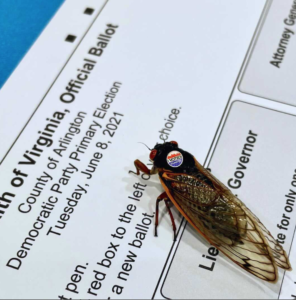 The work on the report is done in-house at no additional costs other than staff time. Dave Nichols, election services manager for Virginia Department of Elections has always been a big part of the production of the report. We wanted to give Dave a special shout-out as he recovers from transplant surgery.
The work on the report is done in-house at no additional costs other than staff time. Dave Nichols, election services manager for Virginia Department of Elections has always been a big part of the production of the report. We wanted to give Dave a special shout-out as he recovers from transplant surgery.
MIT’s Charles Stewart says the post-election report produced by Virginia — in addition to some other unique reports the state produces — is invaluable.
“Virginia is notable for having a group of really important post-election reports that provide a degree of transparency that is distinct among the states. One of those is the post-election report, released after every state election, that addresses a number of items describing how the election was conducted. It is fact-filled and honest,” Stewart said.
It not only reports basic facts that all states report — like the number of new registrants over the past year — but it also reports statistics about complaints received at call systems and assessments from local officials about what worked and what didn’t work.
“It gives voice to local officials to report on the challenges of new legislation and it names names,” Stewart said. “This report goes alongside Virginia’s incredibly detailed reports on list maintenance, voter registration, election-night reporting, and change logs (my favorite) make the state one of the top two or three states in terms of reporting pertinent information to the public after the election.”
electionline Daily News Email
 What’s the best part of waking up? electionline Daily News in your inbox of course so be sure to sign up for your daily dose.
What’s the best part of waking up? electionline Daily News in your inbox of course so be sure to sign up for your daily dose.
Each morning you’ll receive the top headlines of the day, plus a listing of states featured in that day’s news round up.
To sign up, simply visit our site and provide us with your email and you’ll begin receiving the news in your inbox each morning.
We Google so you don’t have to!
Election News This Week
 Election Security: The National Association of State Election Directors (NASED) sent a letter to the US Election Assistance Commission (EAC) regarding the upcoming deprecation of the Voluntary Voting System Guidelines (VVSG) 1.0 in November. The letter strongly urges the EAC to “..immediately undertake a comprehensive messaging and education campaign directed at voters, federal and state legislators, election officials, and members of the media describing what deprecation of the VVSG 1.0 means.” Additionally, the letter said: “The EAC and all their public communications must be unambiguous: voting systems certified to the VVSG 1.0 will remain federally certified after November 15, 2023, and jurisdictions can continue using and purchasing those systems consistent with state or territorial laws and regulations.” You can read the complete letter here.
Election Security: The National Association of State Election Directors (NASED) sent a letter to the US Election Assistance Commission (EAC) regarding the upcoming deprecation of the Voluntary Voting System Guidelines (VVSG) 1.0 in November. The letter strongly urges the EAC to “..immediately undertake a comprehensive messaging and education campaign directed at voters, federal and state legislators, election officials, and members of the media describing what deprecation of the VVSG 1.0 means.” Additionally, the letter said: “The EAC and all their public communications must be unambiguous: voting systems certified to the VVSG 1.0 will remain federally certified after November 15, 2023, and jurisdictions can continue using and purchasing those systems consistent with state or territorial laws and regulations.” You can read the complete letter here.
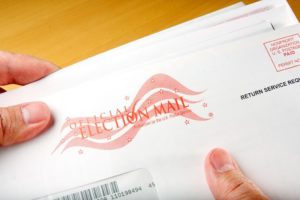 Postal Service News: The U.S. Postal Service has received the Public Service Award for its Election Mail program from the nonpartisan Election Verification Network. The award is given every year to a public official or governmental unit for protecting and promoting election integrity and verifiable elections. “The award is additional recognition of the Postal Service’s successful processing and delivery of Election Mail, which has grown exponentially in recent years,” said Adrienne Marshall, the Postal Service’s director of election and government mail services. “Our 635,000 employees are proud to provide this service for customers who choose to use the U.S. Mail to participate in the democratic process.” The Election Verification Network is comprised of election officials, researchers and advocates focused on secure, transparent and verifiable elections. “The USPS is the only entity in the country that serves every single community, delivers to every voter, and serves every election office across the United States,” said Amber McReynolds, a member of the USPS Board of Governors and current chairwoman of the Board’s Election Mail Committee, in nominating the Postal Service for the award. “USPS has a vital role in the election process — not only for delivering ballot mail but also for polling place notifications, voter registration mailings and election education mailings.”
Postal Service News: The U.S. Postal Service has received the Public Service Award for its Election Mail program from the nonpartisan Election Verification Network. The award is given every year to a public official or governmental unit for protecting and promoting election integrity and verifiable elections. “The award is additional recognition of the Postal Service’s successful processing and delivery of Election Mail, which has grown exponentially in recent years,” said Adrienne Marshall, the Postal Service’s director of election and government mail services. “Our 635,000 employees are proud to provide this service for customers who choose to use the U.S. Mail to participate in the democratic process.” The Election Verification Network is comprised of election officials, researchers and advocates focused on secure, transparent and verifiable elections. “The USPS is the only entity in the country that serves every single community, delivers to every voter, and serves every election office across the United States,” said Amber McReynolds, a member of the USPS Board of Governors and current chairwoman of the Board’s Election Mail Committee, in nominating the Postal Service for the award. “USPS has a vital role in the election process — not only for delivering ballot mail but also for polling place notifications, voter registration mailings and election education mailings.”
 ERIC Update: Late last week two more states — Ohio and Iowa — announced their intention to opt out of ERIC, the Electronic Registration Information Center. Prior to their announcement about leaving, Representatives from the group’s member states met remotely for about three hours to discuss the changes promoted by Republicans, which included dropping a requirement for members to mail notices to people who are eligible but not registered to vote. Currently, ERIC is comprised of 32 states and the District of Columbia, but that number will drop once Alabama, Florida, Missouri and West Virginia formally depart later this year. “The action Ohio is taking today follows nearly a year of good faith, bipartisan efforts to reform ERIC’s oversight and services,” Ohio Secretary of State Frank LaRose, who is considering a run for U.S. Senate in 2024, wrote in a letter. “Unfortunately, these attempts to save what could be an unparalleled election integrity service have fallen short.” Iowa Secretary of State Paul Pate said he would recommend to the governor and Legislature that the state end its membership in ERIC because of the organization’s decision not to amend the membership agreement. He also said the departure of several other states makes the network less valuable. According to the Associated Press, it appears likely that other Republican-led states could also leave. Alaska “will continue to review its membership in ERIC and we do not intend to make any immediate decisions,” Division of Elections spokesperson Tiffany Montemayor said in an email to the AP. In Texas, state election officials announced plans last week to conduct their own “interstate voter registration crosscheck program,” although it’s unclear how they plan to do that and how effective such an effort would be, especially if it involves only a handful of states. Meanwhile, legislation has been introduced that would compel Texas to withdraw from ERIC. Legislation has also been introduced in Arizona that would force the state to drop out of the interstate system.
ERIC Update: Late last week two more states — Ohio and Iowa — announced their intention to opt out of ERIC, the Electronic Registration Information Center. Prior to their announcement about leaving, Representatives from the group’s member states met remotely for about three hours to discuss the changes promoted by Republicans, which included dropping a requirement for members to mail notices to people who are eligible but not registered to vote. Currently, ERIC is comprised of 32 states and the District of Columbia, but that number will drop once Alabama, Florida, Missouri and West Virginia formally depart later this year. “The action Ohio is taking today follows nearly a year of good faith, bipartisan efforts to reform ERIC’s oversight and services,” Ohio Secretary of State Frank LaRose, who is considering a run for U.S. Senate in 2024, wrote in a letter. “Unfortunately, these attempts to save what could be an unparalleled election integrity service have fallen short.” Iowa Secretary of State Paul Pate said he would recommend to the governor and Legislature that the state end its membership in ERIC because of the organization’s decision not to amend the membership agreement. He also said the departure of several other states makes the network less valuable. According to the Associated Press, it appears likely that other Republican-led states could also leave. Alaska “will continue to review its membership in ERIC and we do not intend to make any immediate decisions,” Division of Elections spokesperson Tiffany Montemayor said in an email to the AP. In Texas, state election officials announced plans last week to conduct their own “interstate voter registration crosscheck program,” although it’s unclear how they plan to do that and how effective such an effort would be, especially if it involves only a handful of states. Meanwhile, legislation has been introduced that would compel Texas to withdraw from ERIC. Legislation has also been introduced in Arizona that would force the state to drop out of the interstate system.
 The Kids Are Alright: Lee County, Florida Supervisor of Elections Tommy Doyle has announced the winners of the 2022-2023 High School Voter Registration Challenge with Island Coast High garnering top honors. “Voter education is paramount in ensuring our youth become active participants in the electoral process,” states Tommy Doyle, Lee County Supervisor of Elections. “We’re thankful for our partnerships with the schools and their support in voter education.” Eleven out of the 15 high schools invited by Lee Elections participated in the challenge. Team members from the Lee Elections Community Education Services Department registered and pre-registered 1,256 new voters ages 16 and older across all the participating schools. Southwest Tennessee Community College was honored by the state of Tennessee for its support of students’ civic duties. SWTCC won the two-year community college category in the 2023 Tennessee College Voter Registration Competition for getting students registered to vote in November 2022 during National Voter Registration month. Kentucky Secretary of State Michael Adams announced the winners of his office’s 2022-23 essay contest. The contest was open to all high school students in Kentucky. The participants were asked to answer the question, “How can Kentucky recruit more poll workers?” Adams presented the awards to the winners during halftime at the KHSAA Sweet 16 tournament.
The Kids Are Alright: Lee County, Florida Supervisor of Elections Tommy Doyle has announced the winners of the 2022-2023 High School Voter Registration Challenge with Island Coast High garnering top honors. “Voter education is paramount in ensuring our youth become active participants in the electoral process,” states Tommy Doyle, Lee County Supervisor of Elections. “We’re thankful for our partnerships with the schools and their support in voter education.” Eleven out of the 15 high schools invited by Lee Elections participated in the challenge. Team members from the Lee Elections Community Education Services Department registered and pre-registered 1,256 new voters ages 16 and older across all the participating schools. Southwest Tennessee Community College was honored by the state of Tennessee for its support of students’ civic duties. SWTCC won the two-year community college category in the 2023 Tennessee College Voter Registration Competition for getting students registered to vote in November 2022 during National Voter Registration month. Kentucky Secretary of State Michael Adams announced the winners of his office’s 2022-23 essay contest. The contest was open to all high school students in Kentucky. The participants were asked to answer the question, “How can Kentucky recruit more poll workers?” Adams presented the awards to the winners during halftime at the KHSAA Sweet 16 tournament.
Personnel News: Anchorage, Alaska Municipal Clerk Barbara Jones will retire at the end of June. Longtime Montague, Massachusetts Town Clerk Deb Bordeau is retiring. North Dakota Elections Director Brian Newby has resigned. Northumberland County, Pennsylvania Commissioner Kym Best is officially the chairperson of the Northumberland County Board of Elections. Polly Merriman is the new Graham County, Arizona recorder. Goshen Town Clerk Kristen Estelle recently qualified for the Massachusetts Town Clerks’ Association’s certified Massachusetts municipal clerk designation. Lorena Portillo is the new Clark County, Nevada registrar of voters.
Legislative Updates
 Federal Legislation: Congressmen Andy Kim (NJ-03) and Donald Norcross (NJ-01) re-introduced the Alice Paul Voter Protection Act this week, which will protect a citizen’s access to vote by prohibiting the interference of voter registration efforts. “Alice Paul was a leader in ensuring and protecting the right to vote. It’s important we honor her legacy by continuing her work, and I’m proud to introduce a bill inspired by that legacy that stands up for the rights of all Americans to have unfettered access to the ballot box,” said Congressman Kim. “This bill is also just one step in a larger fight to make our democracy work better for the people. I look forward to working with my colleagues from both sides of the aisle to make it easier for every American to participate in our democratic process.”
Federal Legislation: Congressmen Andy Kim (NJ-03) and Donald Norcross (NJ-01) re-introduced the Alice Paul Voter Protection Act this week, which will protect a citizen’s access to vote by prohibiting the interference of voter registration efforts. “Alice Paul was a leader in ensuring and protecting the right to vote. It’s important we honor her legacy by continuing her work, and I’m proud to introduce a bill inspired by that legacy that stands up for the rights of all Americans to have unfettered access to the ballot box,” said Congressman Kim. “This bill is also just one step in a larger fight to make our democracy work better for the people. I look forward to working with my colleagues from both sides of the aisle to make it easier for every American to participate in our democratic process.”
U.S. Rep. Claudia Tenney is taking aim at what she calls “Zuckerbucks” — grants that were awarded in 2020 to nearly 2,500 election offices, from a nonprofit organization supported by Facebook co-founder Mark Zuckerberg. Tenney, R-New York, has reintroduced a bill that would prohibit 501(c)(3) organizations from donating money or services to election administration agencies. The legislation is in response to the Center for Tech and Civic Life’s giving before the 2020 presidential election. Zuckerberg and his wife, Priscilla Chan, donated $250 million to the organization. Tenney asserts that 92% of the center’s grants were given to “left-leaning districts.” Heavily populated cities that sought the grants received more money than small rural counties, but the organization said “there were no partisan questions in the grant applications” and funding decisions “were not made on a partisan basis.”
 Alabama: House Bill 95 seeks to authorize registered voters to apply for and vote using absentee ballots without an excuse. Under existing law, a registered voter in Alabama may only vote by absentee ballot if they meet one of the criteria prescribed by law for voting absentee. Currently under Alabama law, voters must declare that they will be out of town, incapacitated or otherwise unable to get to the polls in order to cast an absentee ballot. HB 95 would do away with the requirement to fit any of those criteria and allow any registered voter to vote by absentee ballot without an excuse.
Alabama: House Bill 95 seeks to authorize registered voters to apply for and vote using absentee ballots without an excuse. Under existing law, a registered voter in Alabama may only vote by absentee ballot if they meet one of the criteria prescribed by law for voting absentee. Currently under Alabama law, voters must declare that they will be out of town, incapacitated or otherwise unable to get to the polls in order to cast an absentee ballot. HB 95 would do away with the requirement to fit any of those criteria and allow any registered voter to vote by absentee ballot without an excuse.
House Bill 100 would allow disabled voters to designate an individual to deliver their application for an absentee ballot and absentee ballot to the election manager. Under existing law in Alabama, an applicant must deliver their own ballot to the election manager for it to be considered.
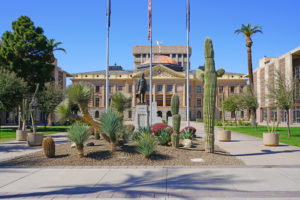 Arizona: A bill awaiting debate in the state Senate would implement new rules for those who bring an early ballot to polling places on Election Day. The measure would require those who do so to surrender their early ballot, then fill out another one in person. That is after producing identification. The move is being billed as a method to get more rapid results. Early ballots dropped off on Election Day aren’t tabulated until later. Counties faced backlash in November’s election after it took several weeks to know who won their races. However, many races were very close, with the Attorney General Kris Mayes only winning by a few hundred votes. Opponents say the measure would add hurdles to those who drop off their ballots at polling places.
Arizona: A bill awaiting debate in the state Senate would implement new rules for those who bring an early ballot to polling places on Election Day. The measure would require those who do so to surrender their early ballot, then fill out another one in person. That is after producing identification. The move is being billed as a method to get more rapid results. Early ballots dropped off on Election Day aren’t tabulated until later. Counties faced backlash in November’s election after it took several weeks to know who won their races. However, many races were very close, with the Attorney General Kris Mayes only winning by a few hundred votes. Opponents say the measure would add hurdles to those who drop off their ballots at polling places.
Insisting that a “made in USA” label means more security, state lawmakers are moving to require that all election equipment be built only with domestic components and assembled in this country. Only thing is, there apparently are no such machines right now that meet those specifications. So Rep. Steve Montenegro, R-Goodyear, has agreed to craft his legislation so it doesn’t kick in until 2028. And even then, any equipment that counties already have would be exempt. But even assuming a domestic manufacturer could be found by then, that’s just part of the problem. Sen. Ken Bennett, R-Prescott, pointed out that HB 2613 would even preclude a tallying machine from having parts from elsewhere that couldn’t possibly affect the outcome of the vote, like plastic housing. And as crafted, all HB 2613 requires is that the parts be sourced and the assembly be conducted in the United States. None of that precludes a foreign firm that has set up shop here — and there are plenty, including major semiconductor chip manufacturers — from meeting those requirements. Montenegro said his measure, which already has been approved by the House may need work before it goes to the full Senate.
Senators voted this week to require new elections any time a certain number of voters claim they were “disenfranchised.” SB 1695, given preliminary approval on a voice vote, would define that to include any time people signed affidavits they had to wait more than 90 minutes outside a polling place. But as crafted, it may not differentiate between those who couldn’t vote and those who stayed and eventually did cast a ballot despite the wait time. And it wouldn’t take much. As crafted by Sen. Jake Hoffman, R-Queen Creek, just 1,000 sworn affidavits from voters in Maricopa County saying they were disenfranchised would require a judge to order a new election there within 60 days. And it would take just 250 affidavits from smaller counties to rerun their elections. What also would trigger a new vote would be if any election official violated any section of the state Election Code or provisions of the Elections Procedures Manual. But the measure does not spell out which violations would count or whether even a minor infraction would toss out the results.
Following in the footsteps of six conservative-led states, Senate Republicans want to pull Arizona’s membership from ERIC. A last-minute amendment to Sen. John Kavanagh’s Senate Bill 1135 would essentially set Arizona on a path to leave ERIC, as well, even though its sponsor says it would put that decision in the hands of ERIC itself. In its original form, SB1135 focused on new regulations and procedures for early voting. But the amendment would preclude the state from being a member of a multistate voter registration organization that requires members to provide information from voter registration records or driver’s licenses “that is otherwise required to be confidential.” That information includes full or partial social security or driver’s license numbers or any records from the Arizona Department of Transportation. The bill would also ban Arizona from being a member of an organization that requires the mailing of voter registration forms to people who are not registered to vote.
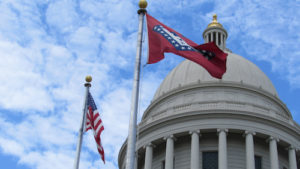 Arkansas: Gov Sarah Huckabee Sanders signed three bills into law that make changes to elections in the Natural State. Senate Bill 254 eliminates write-in candidates from elections. The new law makes it so that candidates cannot register as write-in candidates. It also says that no votes for write-in candidates will be counted in elections. The governor also signed House Bill 1510 into law, which changes when special elections can be held. Now, special elections can only be held on the second Tuesday of March or November during presidential election years or the second Tuesday in May or November any other year. There is an exception for emergency special elections that says special elections can be held any month of the year if certain qualifications are met. The changes will go into effect on January 1, 2024. And there are new rules for paper ballots in Arkansas due to the signing of Senate Bill 250. If a county decides to use paper ballots in an election, the new law says those ballots must be compatible with the state’s electronic vote counters. The ballots have to be put through the machine before being counted by hand. And that count has to be done with numbers submitted to the Arkansas Secretary of State less than 24 hours after the polls close.
Arkansas: Gov Sarah Huckabee Sanders signed three bills into law that make changes to elections in the Natural State. Senate Bill 254 eliminates write-in candidates from elections. The new law makes it so that candidates cannot register as write-in candidates. It also says that no votes for write-in candidates will be counted in elections. The governor also signed House Bill 1510 into law, which changes when special elections can be held. Now, special elections can only be held on the second Tuesday of March or November during presidential election years or the second Tuesday in May or November any other year. There is an exception for emergency special elections that says special elections can be held any month of the year if certain qualifications are met. The changes will go into effect on January 1, 2024. And there are new rules for paper ballots in Arkansas due to the signing of Senate Bill 250. If a county decides to use paper ballots in an election, the new law says those ballots must be compatible with the state’s electronic vote counters. The ballots have to be put through the machine before being counted by hand. And that count has to be done with numbers submitted to the Arkansas Secretary of State less than 24 hours after the polls close.
 California: California won’t be rolling back its election reforms any time soon, after the Assembly Elections Committee voted down AB 13. The bill, from Assemblyman Bill Essayli, R-Riverside, would have ended universal vote-by-mail in the state, returning to pre-pandemic ballot rules. The bill also would also have reinstated a ban on “ballot harvesting,” the practice of collecting multiple ballots and turning them in en masse, by making it so only family members could handle or turn in someone’s ballot. Finally, the bill would have made Election Day a state holiday, which Essayli said might give conservative supporters of the bill heartburn but which would expand voter access to the polls. Assemblyman Isaac Bryan said that AB 13 “undoes the righteous work” that has been done over the last several years to make voting more accessible, especially to people of color or who have disabilities.
California: California won’t be rolling back its election reforms any time soon, after the Assembly Elections Committee voted down AB 13. The bill, from Assemblyman Bill Essayli, R-Riverside, would have ended universal vote-by-mail in the state, returning to pre-pandemic ballot rules. The bill also would also have reinstated a ban on “ballot harvesting,” the practice of collecting multiple ballots and turning them in en masse, by making it so only family members could handle or turn in someone’s ballot. Finally, the bill would have made Election Day a state holiday, which Essayli said might give conservative supporters of the bill heartburn but which would expand voter access to the polls. Assemblyman Isaac Bryan said that AB 13 “undoes the righteous work” that has been done over the last several years to make voting more accessible, especially to people of color or who have disabilities.
Assembly member Isaac Bryan (D-Los Angeles) says some referendum petition circulators misrepresent what their petitions would do and who they work for. He’s introducing a bill that seeks to address those issues. If passed, the bill would require campaigns to disclose key information on the front page of the referendum petitions, like a summary of the measure and the names of its top three donors, in an effort to increase transparency. It would also introduce additional government oversight in the signature-collection process: Paid signature gatherers would be required to register and take training courses with the Secretary of State’s office. And at least 10% of signature gathering efforts would have to be done by volunteers. “What this bill will do is remove some of the paid signature gathering incentives and for actual volunteers — actual people who care about the issues — to go out and convince other people to care about the issues, the way the referendum and ballot process was intended,” Bryan said at a press conference. If passed, the new rules would be applied to both referendum efforts and other petitions to change recently-passed state legislation.
 Connecticut: The Government Administration & Elections Committee has advanced a bill regulating early voting in the Nutmeg State. Under the legislation, there would be 10 days of early voting for statewide and municipal elections, not including the Monday before Election Day to give officials time to rest and reset polling locations. Republican attempts to reduce the number of days; and for the first time require photo ID for all voters, were rejected by majority Democrats during a nearly four-hour meeting. The bill heads next to the state Senate.
Connecticut: The Government Administration & Elections Committee has advanced a bill regulating early voting in the Nutmeg State. Under the legislation, there would be 10 days of early voting for statewide and municipal elections, not including the Monday before Election Day to give officials time to rest and reset polling locations. Republican attempts to reduce the number of days; and for the first time require photo ID for all voters, were rejected by majority Democrats during a nearly four-hour meeting. The bill heads next to the state Senate.
 Delaware: Legislation sponsored by State Rep. Krista Griffith aims to help registered voters navigate elections. House Bill 82 would direct the Delaware Department of Elections to biennially mail a notice to all registered voters regarding polling locations and other election information. Registered voters already receive polling location information and a calendar of important dates, but Griffith says her legislation adds to that traditional voter info. If passed, the notice will be mailed no later than 30 days before the primary election. The legislation also directs the Dept. of Elections to follow a procedure in existing Code for attempting to update and verify voting registration records should the notice be returned as undeliverable. The bill is in committee, and Griffith is confident it will move quickly to the full House for consideration. The legislation has bipartisan support.
Delaware: Legislation sponsored by State Rep. Krista Griffith aims to help registered voters navigate elections. House Bill 82 would direct the Delaware Department of Elections to biennially mail a notice to all registered voters regarding polling locations and other election information. Registered voters already receive polling location information and a calendar of important dates, but Griffith says her legislation adds to that traditional voter info. If passed, the notice will be mailed no later than 30 days before the primary election. The legislation also directs the Dept. of Elections to follow a procedure in existing Code for attempting to update and verify voting registration records should the notice be returned as undeliverable. The bill is in committee, and Griffith is confident it will move quickly to the full House for consideration. The legislation has bipartisan support.
 District of Columbia: Two pieces of elections-related legislation have been allowed to become law in DC without Congressional interference. One bill, the Automatic Voter Registration Expansion Amendment Act will overhaul the city’s approach to voter registration. D.C. will use the information it collects when residents interact with public agencies like the Department of Motor Vehicles to create a running list of people who are “preapproved” to vote. For people on this list, there will be no need to register in advance of an election; all they will have to do is vote. This new law would pair with a reform that the council has adopted but is not yet law, which would set up universal mail-in voting: That bill would apply to people on the “preapproved” list. As a result, D.C. would mail ballots to people it knows are eligible to vote—even if they have not registered. That bill was approved unanimously by the D.C. council in December and signed by the mayor. It became law after the customary congressional review that all D.C. bills undergo expired this week.
District of Columbia: Two pieces of elections-related legislation have been allowed to become law in DC without Congressional interference. One bill, the Automatic Voter Registration Expansion Amendment Act will overhaul the city’s approach to voter registration. D.C. will use the information it collects when residents interact with public agencies like the Department of Motor Vehicles to create a running list of people who are “preapproved” to vote. For people on this list, there will be no need to register in advance of an election; all they will have to do is vote. This new law would pair with a reform that the council has adopted but is not yet law, which would set up universal mail-in voting: That bill would apply to people on the “preapproved” list. As a result, D.C. would mail ballots to people it knows are eligible to vote—even if they have not registered. That bill was approved unanimously by the D.C. council in December and signed by the mayor. It became law after the customary congressional review that all D.C. bills undergo expired this week.
The Local Residents Voting Rights Act, also became law this week. The U.S. House voted to block it in January in a resolution proposed by the GOP and supported by some Democrats, but the Senate did not follow up by the March 14 deadline that was set by the chamber’s parliamentarian. As a result, noncitizens who have been residents of D.C. for 30 days will be able to vote in local elections—including for mayor, city council, education board, and ballot initiatives. The law would not apply to federal elections.
 Idaho: The House of Representatives narrowly killed a bill that would have eliminated registered voters’ ability to sign sworn affidavit to verify their identity and vote in elections. House Bill 137 would have repealed a section of Idaho law that allows registered voters to provide their name and address and complete a signed, sworn affidavit attesting to their identity instead of presenting photo identification. Rep. Joe Alfieri, R-Coeur d’Alene, pushed House Bill 137, saying it would provide enhanced elections security and prevent voter fraud. Alfieri didn’t provide specific examples of anyone in Idaho forging affidavits to vote, but he said there is a potential for fraud and affidavits make it easier to cheat. After a nearly hour-long debate, the Idaho House voted 33-36 to kill House Bill 137, which is now dead for the session.
Idaho: The House of Representatives narrowly killed a bill that would have eliminated registered voters’ ability to sign sworn affidavit to verify their identity and vote in elections. House Bill 137 would have repealed a section of Idaho law that allows registered voters to provide their name and address and complete a signed, sworn affidavit attesting to their identity instead of presenting photo identification. Rep. Joe Alfieri, R-Coeur d’Alene, pushed House Bill 137, saying it would provide enhanced elections security and prevent voter fraud. Alfieri didn’t provide specific examples of anyone in Idaho forging affidavits to vote, but he said there is a potential for fraud and affidavits make it easier to cheat. After a nearly hour-long debate, the Idaho House voted 33-36 to kill House Bill 137, which is now dead for the session.
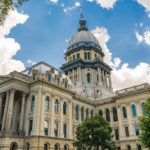 Illinois: There are currently three bills pending in the General Assembly that would allow ranked choice voting in one form or another. House Bill 2716, by Rep. Nabeela Syed, D-Inverness, would implement the system for elections for the General Assembly, governor and other statewide constitutional officers. House Bill 2807, by Rep. Maurice West, D-Rockford, would establish ranked choice voting in presidential primaries in Illinois. And House Bill 3749, by Rep. Kam Buckner, D-Chicago, would allow municipalities to use ranked choice voting if the municipality’s chief election authority submits a written statement saying they have the ability to conduct such an election.
Illinois: There are currently three bills pending in the General Assembly that would allow ranked choice voting in one form or another. House Bill 2716, by Rep. Nabeela Syed, D-Inverness, would implement the system for elections for the General Assembly, governor and other statewide constitutional officers. House Bill 2807, by Rep. Maurice West, D-Rockford, would establish ranked choice voting in presidential primaries in Illinois. And House Bill 3749, by Rep. Kam Buckner, D-Chicago, would allow municipalities to use ranked choice voting if the municipality’s chief election authority submits a written statement saying they have the ability to conduct such an election.
 Indiana: The Senate Elections Committee rejected an effort to allow anyone to vote absentee by mail in Indiana. The rejection comes as a bill to add greater voter ID requirements to vote-by-mail heads to the full Senate. The bill, HB 1334, requires voters who mail in an application to vote by mail to include either their driver’s license, state ID or voting ID number, or a photocopy of a photo ID they can use for voting. Rep. Tim Wesco (R-Osceola) said his bill simply extends voter ID requirements used for in-person voting to voting by mail. “I’ve long felt that the process of simply matching signatures as the means of verifying the authenticity of an absentee ballot application is insufficient and extremely subjective,” Wesco said. Democrats objected, saying Wesco’s bill creates an unnecessary hurdle. But Sen. J.D. Ford (R-Indianapolis) said if they’re going to add this requirement, then vote-by-mail should be open to everyone. He proposed an amendment to eliminate the excuses needed to cast a mail-in ballot.
Indiana: The Senate Elections Committee rejected an effort to allow anyone to vote absentee by mail in Indiana. The rejection comes as a bill to add greater voter ID requirements to vote-by-mail heads to the full Senate. The bill, HB 1334, requires voters who mail in an application to vote by mail to include either their driver’s license, state ID or voting ID number, or a photocopy of a photo ID they can use for voting. Rep. Tim Wesco (R-Osceola) said his bill simply extends voter ID requirements used for in-person voting to voting by mail. “I’ve long felt that the process of simply matching signatures as the means of verifying the authenticity of an absentee ballot application is insufficient and extremely subjective,” Wesco said. Democrats objected, saying Wesco’s bill creates an unnecessary hurdle. But Sen. J.D. Ford (R-Indianapolis) said if they’re going to add this requirement, then vote-by-mail should be open to everyone. He proposed an amendment to eliminate the excuses needed to cast a mail-in ballot.
 Kentucky: A bill that makes several changes to election procedures in Kentucky is now going to the governor for final approval. The bill passed with bi-partisan support after some changes were implemented accepted. It will keep some of the state’s polices intact that were implemented during the pandemic, including expanded early voting and the use of mail-in ballots in some cases. Early voting can now happen for three days ahead of the election. The bill would also prevent clerks from consolidating or closing down polling centers. It also allows each county to create a so-called vote center where anyone who is registered to vote in that county may do so. Absentee voters will be allowed to submit their votes in drop boxes and allow clerks to start counting ballots up to two weeks days before Election Day. House Bill 302 will also implement new features designed to make the voting process more secure; like rules making it easier to take voters off the rolls who have moved out of state and expanding the ban on “ballot harvesting” the collection of absentee ballots by a third party.
Kentucky: A bill that makes several changes to election procedures in Kentucky is now going to the governor for final approval. The bill passed with bi-partisan support after some changes were implemented accepted. It will keep some of the state’s polices intact that were implemented during the pandemic, including expanded early voting and the use of mail-in ballots in some cases. Early voting can now happen for three days ahead of the election. The bill would also prevent clerks from consolidating or closing down polling centers. It also allows each county to create a so-called vote center where anyone who is registered to vote in that county may do so. Absentee voters will be allowed to submit their votes in drop boxes and allow clerks to start counting ballots up to two weeks days before Election Day. House Bill 302 will also implement new features designed to make the voting process more secure; like rules making it easier to take voters off the rolls who have moved out of state and expanding the ban on “ballot harvesting” the collection of absentee ballots by a third party.
 Maine: Sen. Jim Libby (R-Standish) is pushing a bill co-sponsored by state Sen. Eric Brakey (R-Auburn), to drop certain electioneering restrictions. It would also allow candidates to tell voters what office they’re running for. But others say the rules about conduct at the polls should be even tougher. A bill sponsored by state Sen. Peggy Rotundo, a Lewiston Democrat, would add new restrictions on campaign buttons at the polls. Secretary of State Shenna Bellows told a legislative panel that “any scintilla of electioneering has no place anywhere near a polling place.” “Voters should feel comfortable walking into and out of their polling place without feeling obligated to speak to candidates trying to convince them of their qualifications or pressured to have to change their vote based on this interaction.”
Maine: Sen. Jim Libby (R-Standish) is pushing a bill co-sponsored by state Sen. Eric Brakey (R-Auburn), to drop certain electioneering restrictions. It would also allow candidates to tell voters what office they’re running for. But others say the rules about conduct at the polls should be even tougher. A bill sponsored by state Sen. Peggy Rotundo, a Lewiston Democrat, would add new restrictions on campaign buttons at the polls. Secretary of State Shenna Bellows told a legislative panel that “any scintilla of electioneering has no place anywhere near a polling place.” “Voters should feel comfortable walking into and out of their polling place without feeling obligated to speak to candidates trying to convince them of their qualifications or pressured to have to change their vote based on this interaction.”
State and local election officials challenged a proposal to outlaw ballot drop boxes used by the majority of Maine’s nearly 500 municipalities in the last election. The proposal by state Sen. Eric Brakey (R-Auburn), would join Maine with the roughly dozen states that have banned ballot drop boxes since 2020. Popularized during the pandemic, the drop boxes are an alleged conduit for fraudulent voting — claims that have been widely disproven. In testimony before the Veterans and Legal Affairs Committee, Brakey described drop ballot boxes as less secure than in-person voting. He framed his bill as an effort to restore voter confidence. His assertions were contested by civic engagement groups, the association representing local election clerks and deputy Secretary of State Joann Bautista. They explained that drop boxes are often bolted to the ground or attached to municipal buildings and the ballots in them routinely collected and checked against local voter rolls before being counted.
 Maryland: The House of Delegates approved an amended election reform bill that would move the primary from April 23 to May 14. House and Senate leaders wanted to move the primary, from April 23 because that was the first full day of Passover, a day when observant Jews were prohibited by Jewish law from any kind of work including voting. Lawmakers originally wanted to move the primary up a week to April 16, but that is the first full day of Ramadan. So the primary under this bill is moved to May 14. The bill will go to the Senate, which is expected to be approved before the legislative session ends.
Maryland: The House of Delegates approved an amended election reform bill that would move the primary from April 23 to May 14. House and Senate leaders wanted to move the primary, from April 23 because that was the first full day of Passover, a day when observant Jews were prohibited by Jewish law from any kind of work including voting. Lawmakers originally wanted to move the primary up a week to April 16, but that is the first full day of Ramadan. So the primary under this bill is moved to May 14. The bill will go to the Senate, which is expected to be approved before the legislative session ends.
 East Lansing, Michigan: Without comment, council members unanimously approved, 5-0, on a moratorium that took immediate effect and directed City Attorney Tony Chubb to draft a resolution to repeal a decade-old ordinance that requires landlords to provide voter information to new tenants. The first reading is supposed to happen at council’s next April 4 meeting. A second reading, with a vote, is expected April 18. “Whereas the City Council of the City of East Lansing has determined that the ordinance is not actively enforced by the city and that the form of voter outreach set forth in the ordinance has been largely replaced by online voter initiatives, it is further unnecessary due to changes in state law allowing for same day voting,” Chubb said before the moratorium vote. The city had recently been sued by East Lansing-based Hagan Realty Inc., claiming the city has been violating landlords’ First Amendment rights by forcing them to provide voter application forms and other information to new tenants.
East Lansing, Michigan: Without comment, council members unanimously approved, 5-0, on a moratorium that took immediate effect and directed City Attorney Tony Chubb to draft a resolution to repeal a decade-old ordinance that requires landlords to provide voter information to new tenants. The first reading is supposed to happen at council’s next April 4 meeting. A second reading, with a vote, is expected April 18. “Whereas the City Council of the City of East Lansing has determined that the ordinance is not actively enforced by the city and that the form of voter outreach set forth in the ordinance has been largely replaced by online voter initiatives, it is further unnecessary due to changes in state law allowing for same day voting,” Chubb said before the moratorium vote. The city had recently been sued by East Lansing-based Hagan Realty Inc., claiming the city has been violating landlords’ First Amendment rights by forcing them to provide voter application forms and other information to new tenants.
 Bemidji, Minnesota: The Bemidji City Council has voted in support of ranked choice voting for local elections. The vote at this week’s meeting came just days after the Bemidji Charter Commission also voiced their support in favor of the practice. The resolution passed in a 4-2 vote, with Mayor Jorge Prince and Ward 2 Councilor Josh Peterson in opposition. If approved at the state level, where a bill is currently going through committees, the city council would need to unanimously approve the use of ranked choice voting for implementation. If it is not approved, a vote to adjust the city charter as needed would be put before the citizens as a ballot question.
Bemidji, Minnesota: The Bemidji City Council has voted in support of ranked choice voting for local elections. The vote at this week’s meeting came just days after the Bemidji Charter Commission also voiced their support in favor of the practice. The resolution passed in a 4-2 vote, with Mayor Jorge Prince and Ward 2 Councilor Josh Peterson in opposition. If approved at the state level, where a bill is currently going through committees, the city council would need to unanimously approve the use of ranked choice voting for implementation. If it is not approved, a vote to adjust the city charter as needed would be put before the citizens as a ballot question.
 Mississippi: Mississippi’s Senate is sending SB 2358 to the governor’s desk that would penalize anyone who collects absentee ballots, acting as an intermediary between the county’s circuit clerk’s office. Opponents of the bill say this would hypothetically prevent a church from helping homebound members cast their ballot. But Secretary of State Michael Watson says it’s a security precaution. In a statement, Reeves said the intent of Senate Bill 2358 was to “uphold the integrity of the election process” by prohibiting individuals or organizations from handling “massive amounts of absentee ballots” during an election, a process he claims is an “open invitation for fraud and abuse.”
Mississippi: Mississippi’s Senate is sending SB 2358 to the governor’s desk that would penalize anyone who collects absentee ballots, acting as an intermediary between the county’s circuit clerk’s office. Opponents of the bill say this would hypothetically prevent a church from helping homebound members cast their ballot. But Secretary of State Michael Watson says it’s a security precaution. In a statement, Reeves said the intent of Senate Bill 2358 was to “uphold the integrity of the election process” by prohibiting individuals or organizations from handling “massive amounts of absentee ballots” during an election, a process he claims is an “open invitation for fraud and abuse.”
House lawmakers have also advanced HB 1306 which would enhance penalties for Mississippians who vote twice in an election. This action is currently classified as a misdemeanor, which would be changed to a felony charge. Republican Representative Prince Wallace says systems are in place to prevent someone from voting twice, but Democratic Representative Zakiya Summers asked during floor debate what happens when someone slips through the cracks.
 Missouri: Senate Bill 98, sponsored by Sen. Bill Eigel, R-Weldon Spring, would require paper ballots for future elections. “This would address the concerns and the possibilities that these machines may … be vulnerable to interference in our elections,” Eigel said. The 82-page bill also would prevent interstate collaboration with organizations designed to share voter poll data, such as the Electronic Registration Information Center, which Missouri left earlier this month. The bill also contains a provision allowing any registered voter eligible to vote in an election to contest the results of that election in court. Several citizens spoke in support of the bill, charging that voting machines are not properly accredited and are susceptible to cybersecurity risks. Speaking in opposition, Eric Fey, Democratic director of elections for St. Louis County, countered that machine-produced results are always audited. Fey added that voting machines make it easier for voters to correct their ballot if they made mistakes, and that counting ballots by hand has historically made elections susceptible to fraud, such as stuffing ballot boxes and marking tally sheets incorrectly.
Missouri: Senate Bill 98, sponsored by Sen. Bill Eigel, R-Weldon Spring, would require paper ballots for future elections. “This would address the concerns and the possibilities that these machines may … be vulnerable to interference in our elections,” Eigel said. The 82-page bill also would prevent interstate collaboration with organizations designed to share voter poll data, such as the Electronic Registration Information Center, which Missouri left earlier this month. The bill also contains a provision allowing any registered voter eligible to vote in an election to contest the results of that election in court. Several citizens spoke in support of the bill, charging that voting machines are not properly accredited and are susceptible to cybersecurity risks. Speaking in opposition, Eric Fey, Democratic director of elections for St. Louis County, countered that machine-produced results are always audited. Fey added that voting machines make it easier for voters to correct their ballot if they made mistakes, and that counting ballots by hand has historically made elections susceptible to fraud, such as stuffing ballot boxes and marking tally sheets incorrectly.
 Montana: In a House State Administration hearing this week, Sen. Shelley Vance, R-Belgrade, said it was never her intention to affect agreements between tribes and counties in a bill that would prohibit private funds from being used to conduct elections in the state. Senate Bill 117 was amended to make sure tribes would be able to donate space or their own funds for the purposes of an election. But opponents said the bill still needs work. Patrick Yawakie, speaking on behalf of the Blackfeet Tribe, said the tribe would like to see an amendment added that would ensure the bill would not interfere with aspects of operating a satellite ballot office, including providing donated labor, internet services, cybersecurity and other in-kind donations. The bill passed third reading in the Senate on a 34-14 vote. In the hearing Tuesday, the bill received seven proponents and three opponents. The committee didn’t immediately take action on the bill.
Montana: In a House State Administration hearing this week, Sen. Shelley Vance, R-Belgrade, said it was never her intention to affect agreements between tribes and counties in a bill that would prohibit private funds from being used to conduct elections in the state. Senate Bill 117 was amended to make sure tribes would be able to donate space or their own funds for the purposes of an election. But opponents said the bill still needs work. Patrick Yawakie, speaking on behalf of the Blackfeet Tribe, said the tribe would like to see an amendment added that would ensure the bill would not interfere with aspects of operating a satellite ballot office, including providing donated labor, internet services, cybersecurity and other in-kind donations. The bill passed third reading in the Senate on a 34-14 vote. In the hearing Tuesday, the bill received seven proponents and three opponents. The committee didn’t immediately take action on the bill.
 Nebraska: Three bills in the Nebraska Legislature are aiming to tighten election security. The three bills are LB457 introduced by Senator Rick Holdcroft, LB193, and LB808 by Senator Steve Halloran. In sum, the three bills would require all voting machine parts to be manufactured in the United States to lessen the chance of foreign tampering, to implement video recording devices in all voting locations, as well as giving counties the option to hand recount future legislative races instead of machine counting. Supporters based their arguments off of claims of people receiving mail-in ballots who no longer live in the state, as well as the possibility of new technology that could allow unauthorized individuals to compromise voting machines. The opponents based their claims on the lack of official evidence of intentional voter tampering, and the fact that the bills would cost Nebraska taxpayers $16 million. The government, military, and veterans affairs committee will decide whether to vote these bills to the debate floor.
Nebraska: Three bills in the Nebraska Legislature are aiming to tighten election security. The three bills are LB457 introduced by Senator Rick Holdcroft, LB193, and LB808 by Senator Steve Halloran. In sum, the three bills would require all voting machine parts to be manufactured in the United States to lessen the chance of foreign tampering, to implement video recording devices in all voting locations, as well as giving counties the option to hand recount future legislative races instead of machine counting. Supporters based their arguments off of claims of people receiving mail-in ballots who no longer live in the state, as well as the possibility of new technology that could allow unauthorized individuals to compromise voting machines. The opponents based their claims on the lack of official evidence of intentional voter tampering, and the fact that the bills would cost Nebraska taxpayers $16 million. The government, military, and veterans affairs committee will decide whether to vote these bills to the debate floor.
 Nevada: Counties and cities could be on the hook for repaying the state for unused voting machines under a bill being considered by lawmakers. Senate Bill 215, presented by state Sen. James Ohrenschall, D-Las Vegas, would require counties and cities that choose to stop using voting machines purchased with state funds to return the money to the state. The bill comes in response to some counties that considered using paper ballots and hand counting, ostensibly to ensure election integrity. The bill would not be retroactive, meaning counties that have already opted to stop using voting machines wouldn’t be required to pay the money back. If passed, the bill would become effective on July 1. The proposed legislation was suggested by an interim legislative committee, which voted in August to request a version of the bill be introduced during the 2023 legislative session.
Nevada: Counties and cities could be on the hook for repaying the state for unused voting machines under a bill being considered by lawmakers. Senate Bill 215, presented by state Sen. James Ohrenschall, D-Las Vegas, would require counties and cities that choose to stop using voting machines purchased with state funds to return the money to the state. The bill comes in response to some counties that considered using paper ballots and hand counting, ostensibly to ensure election integrity. The bill would not be retroactive, meaning counties that have already opted to stop using voting machines wouldn’t be required to pay the money back. If passed, the bill would become effective on July 1. The proposed legislation was suggested by an interim legislative committee, which voted in August to request a version of the bill be introduced during the 2023 legislative session.
 New Hampshire: HB 460, sponsored by Republicans Robert Lynn, a former chief justice in the New Hampshire Supreme Court, and Daniel Popovici-Muller, would reverse a law passed last year which gives people 10 days to prove their residency and citizenship after they cast an “affidavit ballot” if they don’t have required documents with them at the polling location. Voters have long had the option to sign an affidavit attesting to their eligibility to vote even before the changes passed last year, with an established process for state officials to follow up and confirm the validity of those affidavits. Members of the House Election Law Committee deadlocked earlier this month in a 10-10 vote on whether to endorse the bill – a vote that fell entirely by party lines, with Republicans in support and Democrats against.
New Hampshire: HB 460, sponsored by Republicans Robert Lynn, a former chief justice in the New Hampshire Supreme Court, and Daniel Popovici-Muller, would reverse a law passed last year which gives people 10 days to prove their residency and citizenship after they cast an “affidavit ballot” if they don’t have required documents with them at the polling location. Voters have long had the option to sign an affidavit attesting to their eligibility to vote even before the changes passed last year, with an established process for state officials to follow up and confirm the validity of those affidavits. Members of the House Election Law Committee deadlocked earlier this month in a 10-10 vote on whether to endorse the bill – a vote that fell entirely by party lines, with Republicans in support and Democrats against.
 North Dakota: Lawmakers are considering a number of bills that affect the state’s elections. When the Legislative session started three months ago, lawmakers had more than 30 bills related to elections in front of them. By this point in the session, that number has been whittled down, but there are still at least a dozen remaining. One bill being considered – HB 1273 – would do away with approval and ranked-choice voting; another – HB 1230 – would increase penalties for people that willfully violate the state’s signature-collecting laws. Another bill, HB 1529, would ask the Legislature to study the state’s campaign finance laws so lawmakers can make changes to the statute next session. House Bill 1192 takes out the word ‘electronic’ from voting systems. It also allows county auditors to start counting early and absentee votes three days before election day. It also clarifies that in a presidential year, electors meet on the first Tuesday after the second Wednesday in December to cast their votes in the electoral college. This week, the house also passed Senate Bill 2292, which says a person can’t cause a disturbance at a polling place. But a person may observe the voting process so long as they inform the inspector ahead of time and don’t infringe on voter privacy.
North Dakota: Lawmakers are considering a number of bills that affect the state’s elections. When the Legislative session started three months ago, lawmakers had more than 30 bills related to elections in front of them. By this point in the session, that number has been whittled down, but there are still at least a dozen remaining. One bill being considered – HB 1273 – would do away with approval and ranked-choice voting; another – HB 1230 – would increase penalties for people that willfully violate the state’s signature-collecting laws. Another bill, HB 1529, would ask the Legislature to study the state’s campaign finance laws so lawmakers can make changes to the statute next session. House Bill 1192 takes out the word ‘electronic’ from voting systems. It also allows county auditors to start counting early and absentee votes three days before election day. It also clarifies that in a presidential year, electors meet on the first Tuesday after the second Wednesday in December to cast their votes in the electoral college. This week, the house also passed Senate Bill 2292, which says a person can’t cause a disturbance at a polling place. But a person may observe the voting process so long as they inform the inspector ahead of time and don’t infringe on voter privacy.
 Oklahoma: House Bill 1629 would clarify that anyone who receives a sentence commutation to time served or is granted a pardon is eligible to vote. It also adds language that a person may register to vote if their sentence has been discharged, terminology the Department of Corrections uses to indicate that a sentence has been completed with no further obligations to the state. Rep. Regina Goodwin, D-Tulsa, who introduced the bill, said the bill simply seeks to align what the Department of Corrections and State Election Board view as a completed sentence. “Folks will feel comfortable being able to instruct folks on what they can and cannot do, and I absolutely think that’s important,” Goodwin said. “If people are misinterpreting the law, which has happened with senators and representatives getting it confused, that’s why we need to do our level best to make the language as simple as possible.” The bill cleared the House Ethics and Elections Committee without objection and is eligible for consideration on the House floor. The deadline for bills to pass out of their chamber of origin is Thursday, March 23. As the House committee considered the bill, State Election Board Secretary Paul Ziriax said its passage would allow state and county election officials to offer better guidance to people with felony convictions. “I think spelling it out in black and white in the statute will make it much, much clearer not just for election officials, but also for prospective voters,” Ziriax said.
Oklahoma: House Bill 1629 would clarify that anyone who receives a sentence commutation to time served or is granted a pardon is eligible to vote. It also adds language that a person may register to vote if their sentence has been discharged, terminology the Department of Corrections uses to indicate that a sentence has been completed with no further obligations to the state. Rep. Regina Goodwin, D-Tulsa, who introduced the bill, said the bill simply seeks to align what the Department of Corrections and State Election Board view as a completed sentence. “Folks will feel comfortable being able to instruct folks on what they can and cannot do, and I absolutely think that’s important,” Goodwin said. “If people are misinterpreting the law, which has happened with senators and representatives getting it confused, that’s why we need to do our level best to make the language as simple as possible.” The bill cleared the House Ethics and Elections Committee without objection and is eligible for consideration on the House floor. The deadline for bills to pass out of their chamber of origin is Thursday, March 23. As the House committee considered the bill, State Election Board Secretary Paul Ziriax said its passage would allow state and county election officials to offer better guidance to people with felony convictions. “I think spelling it out in black and white in the statute will make it much, much clearer not just for election officials, but also for prospective voters,” Ziriax said.
 Pennsylvania: State Sen. Doug Mastriano is pushing forward with another election reform bill that would change the law surrounding poll watchers. Mastriano’s new bill would allow any registered voter to be a poll watcher in any precinct across the state, meaning that someone from Beaver County can travel 340 miles to Philadelphia to monitor proceedings at a polling location they’ve never seen. Current law requires watchers stay in their home county. The bill also mandates that watchers have a clear view of pre-canvassing ballots from no more than six feet away, and also includes language that penalizes election officials who impede poll watchers. A nearly identical bill was passed by the Republican-controlled Senate last session and vetoed by Gov. Tom Wolf.
Pennsylvania: State Sen. Doug Mastriano is pushing forward with another election reform bill that would change the law surrounding poll watchers. Mastriano’s new bill would allow any registered voter to be a poll watcher in any precinct across the state, meaning that someone from Beaver County can travel 340 miles to Philadelphia to monitor proceedings at a polling location they’ve never seen. Current law requires watchers stay in their home county. The bill also mandates that watchers have a clear view of pre-canvassing ballots from no more than six feet away, and also includes language that penalizes election officials who impede poll watchers. A nearly identical bill was passed by the Republican-controlled Senate last session and vetoed by Gov. Tom Wolf.
 Utah: Gov. Spencer Cox has signed HB347, which would increase the penalty for tampering with ballot drop boxes. Rep. Michael Petersen, R-North Logan, said his bill would make drop box tampering a third-degree felony, which comes with up to five years in prison and a fine up to $5,000.
Utah: Gov. Spencer Cox has signed HB347, which would increase the penalty for tampering with ballot drop boxes. Rep. Michael Petersen, R-North Logan, said his bill would make drop box tampering a third-degree felony, which comes with up to five years in prison and a fine up to $5,000.
 Wisconsin: State lawmakers want the Wisconsin Elections Commission to delete ineligible voters from the commission’s statewide master database and put them in a separate list that WEC would maintain as well. The bill, AB-21/SB-26, focuses on WisVote, WEC’s electronic voting database, which includes the names of everyone in Wisconsin registered to vote. As it’s currently set up, the registration information for individuals in the database who are not eligible to vote is changed from “eligible” to “ineligible.” The proposed change calls for removing ineligible people from the database and maintaining a separate, permanent record of everyone removed and when and why they were removed. In a fiscal note and analysis of the bill submitted in February, WEC staff said that the commission’s electronic database was much more than simply a list of registered voters. “There is not a physical ‘registration list,’” the fiscal note states.
Wisconsin: State lawmakers want the Wisconsin Elections Commission to delete ineligible voters from the commission’s statewide master database and put them in a separate list that WEC would maintain as well. The bill, AB-21/SB-26, focuses on WisVote, WEC’s electronic voting database, which includes the names of everyone in Wisconsin registered to vote. As it’s currently set up, the registration information for individuals in the database who are not eligible to vote is changed from “eligible” to “ineligible.” The proposed change calls for removing ineligible people from the database and maintaining a separate, permanent record of everyone removed and when and why they were removed. In a fiscal note and analysis of the bill submitted in February, WEC staff said that the commission’s electronic database was much more than simply a list of registered voters. “There is not a physical ‘registration list,’” the fiscal note states.
 Wyoming: Gov. Mark Gordon vetoed a ballot form bill that he argued could confuse voters and suppress absentee voting. He explained his reasoning for the veto of Senate File 131 in a letter addressed to Secretary of State Chuck Gray, but started with defending Wyoming’s election integrity. The governor said election integrity and security were campaign issues for several candidates, which led to bills being brought forward to address those concerns and follow through on campaign promises in the general session. “I want to be clear. At no time have I been presented with facts of fraud, mismanagement, or malfeasance in Wyoming’s election process. Even so, over the past month, I have signed those bills which strengthen election integrity and security, such as codifying existing election rules,” he wrote. However, he said the prohibition on delivery of unsolicited ballot forms bill was “superfluous and potentially confusing” when it came to his desk. Although there were amendments before SF 131 made it to final reading in the House, it was a small bill originally designed to bar anyone except a county clerk or the secretary of state from distributing “an absentee ballot request form by mail, email, or any other means, which claims to be an official elected document, to any qualified elector.”
Wyoming: Gov. Mark Gordon vetoed a ballot form bill that he argued could confuse voters and suppress absentee voting. He explained his reasoning for the veto of Senate File 131 in a letter addressed to Secretary of State Chuck Gray, but started with defending Wyoming’s election integrity. The governor said election integrity and security were campaign issues for several candidates, which led to bills being brought forward to address those concerns and follow through on campaign promises in the general session. “I want to be clear. At no time have I been presented with facts of fraud, mismanagement, or malfeasance in Wyoming’s election process. Even so, over the past month, I have signed those bills which strengthen election integrity and security, such as codifying existing election rules,” he wrote. However, he said the prohibition on delivery of unsolicited ballot forms bill was “superfluous and potentially confusing” when it came to his desk. Although there were amendments before SF 131 made it to final reading in the House, it was a small bill originally designed to bar anyone except a county clerk or the secretary of state from distributing “an absentee ballot request form by mail, email, or any other means, which claims to be an official elected document, to any qualified elector.”
Legal Updates
 Federal Litigation: Fox News and Dominion Voting Systems faced off in court this week during a key hearing over whether journalists have a responsibility to be cautious with explosive and implausible allegations. Attorneys for Dominion argued that Fox recklessly repeated false accusations from supporters of former President Donald Trump that its machines and the software used were responsible for Trump’s 2020 election loss. Documents released during the lawsuit have shown that top Fox executives and personalities didn’t believe the claims but aired them anyway. “There was a deliberate decision by those responsible for the broadcasts … to let the story be out there,” Dominion attorney Rodney Smolla said, adding that Fox News was desperate to win back viewers infuriated that the network had correctly called Arizona, a key battleground state, on election night for Joe Biden. “What they did to get viewers back was start this new narrative that the election had been stolen and that Dominion was the thief.” Fox contended it was simply reporting on newsworthy allegations — a sitting president’s claim that the election was being stolen from him. “We never reported those to be true,” Fox lawyer Erin Murphy said. “All we ever did was provide viewers the true fact that these were allegations that were being made.” Delaware Superior Court Judge Eric Davis told lawyers for both sides he hasn’t made up his mind. “I need to be educated,” the judge said as the hearing began. “I haven’t pre-decided this.”
Federal Litigation: Fox News and Dominion Voting Systems faced off in court this week during a key hearing over whether journalists have a responsibility to be cautious with explosive and implausible allegations. Attorneys for Dominion argued that Fox recklessly repeated false accusations from supporters of former President Donald Trump that its machines and the software used were responsible for Trump’s 2020 election loss. Documents released during the lawsuit have shown that top Fox executives and personalities didn’t believe the claims but aired them anyway. “There was a deliberate decision by those responsible for the broadcasts … to let the story be out there,” Dominion attorney Rodney Smolla said, adding that Fox News was desperate to win back viewers infuriated that the network had correctly called Arizona, a key battleground state, on election night for Joe Biden. “What they did to get viewers back was start this new narrative that the election had been stolen and that Dominion was the thief.” Fox contended it was simply reporting on newsworthy allegations — a sitting president’s claim that the election was being stolen from him. “We never reported those to be true,” Fox lawyer Erin Murphy said. “All we ever did was provide viewers the true fact that these were allegations that were being made.” Delaware Superior Court Judge Eric Davis told lawyers for both sides he hasn’t made up his mind. “I need to be educated,” the judge said as the hearing began. “I haven’t pre-decided this.”
 Arizona: The Arizona Supreme Court said in paperwork filed this week the justices are granting the review of one of Kari Lake’s seven claims. The complaint challenges how the Maricopa County recorder applied its signature verification policies during the election. The Supreme Court said since it was a challenge of application, not the policies themselves, it could move to a trial court. The Supreme Court won’t hear the case. As for the other six challenges, the Supreme Court said they were focused on the proceedings in the trial court and were made on “insufficient” grounds. Also in the Supreme Court’s order were possible sanctions for Lake’s claim that “35,563 unaccounted-for ballots were added to the total of ballots at a third-party processing facility.” Lake has argued that elections officials failed to follow the law when they declared Democrat Katie Hobbs won the race for governor in November. A trial court and the Court of Appeals had thrown out Lake’s legal claims. The Supreme Court did not make any judgment as to whether Lake’s claim would succeed.
Arizona: The Arizona Supreme Court said in paperwork filed this week the justices are granting the review of one of Kari Lake’s seven claims. The complaint challenges how the Maricopa County recorder applied its signature verification policies during the election. The Supreme Court said since it was a challenge of application, not the policies themselves, it could move to a trial court. The Supreme Court won’t hear the case. As for the other six challenges, the Supreme Court said they were focused on the proceedings in the trial court and were made on “insufficient” grounds. Also in the Supreme Court’s order were possible sanctions for Lake’s claim that “35,563 unaccounted-for ballots were added to the total of ballots at a third-party processing facility.” Lake has argued that elections officials failed to follow the law when they declared Democrat Katie Hobbs won the race for governor in November. A trial court and the Court of Appeals had thrown out Lake’s legal claims. The Supreme Court did not make any judgment as to whether Lake’s claim would succeed.
Arizona Secretary of State Adrian Fontes has asked an Arizona Superior Court judge to order Mark Finchem to pay about $67,000 in sanctions. When Fontes defeated Finchem in the secretary of state race, Finchem claimed misconduct and sued. That case was deemed groundless and “not brought in good faith.” The court then sanctioned Finchem. Fontes is also petitioning the state Supreme Court to dismiss former governor candidate Kari Lake’s election suit, saying it too is groundless.
 Arkansas: Pulaski County Circuit Judge Tim Fox has dismissed Election Systems & Software, LLC from a three-month-old lawsuit brought by a former Congressional candidate to stop Arkansas election officials from using bar-code voting machines. Arkansas election officials from using bar-code voting machines left open the possibility that the Nebraska-based manufacturer could be sued if Conrad Reynolds can show evidence of wrongdoing by the company. Election Systems’ lawyer Kevin Crass with the Friday Firm had argued that the company should be dropped from the lawsuit because the machines complied “with all applicable law and standards” and the litigation included no allegations Election Systems had broken any laws. The remaining defendants are Republican Secretary of State John Thurston and the State Board of Election Commissioners. State records show the secretary of state has paid out $331,720 to Election Systems, with $315,000 in election-related services and $16,720 in technical services. The suit alleges the machines fall short under a provision of Arkansas Code 7-5-504 that require such machines “shall permit the voter to verify in a private and independent manner the votes selected by the voter on the ballot before the ballot is cast.” Likewise, the machines do not comply with the federal Help America Vote Act of 2002, which governs federal elections, the suit states.
Arkansas: Pulaski County Circuit Judge Tim Fox has dismissed Election Systems & Software, LLC from a three-month-old lawsuit brought by a former Congressional candidate to stop Arkansas election officials from using bar-code voting machines. Arkansas election officials from using bar-code voting machines left open the possibility that the Nebraska-based manufacturer could be sued if Conrad Reynolds can show evidence of wrongdoing by the company. Election Systems’ lawyer Kevin Crass with the Friday Firm had argued that the company should be dropped from the lawsuit because the machines complied “with all applicable law and standards” and the litigation included no allegations Election Systems had broken any laws. The remaining defendants are Republican Secretary of State John Thurston and the State Board of Election Commissioners. State records show the secretary of state has paid out $331,720 to Election Systems, with $315,000 in election-related services and $16,720 in technical services. The suit alleges the machines fall short under a provision of Arkansas Code 7-5-504 that require such machines “shall permit the voter to verify in a private and independent manner the votes selected by the voter on the ballot before the ballot is cast.” Likewise, the machines do not comply with the federal Help America Vote Act of 2002, which governs federal elections, the suit states.
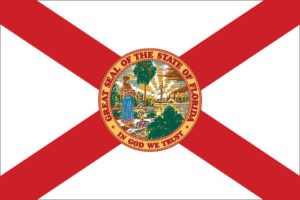 Florida: The NAACP and Vote.org are challenging a Florida law that bars the use of digital signatures on voter registration forms, bringing a federal lawsuit against the state similar to ones pending in Texas and Georgia. The legal action targets what is known as Florida’s “wet signature” requirement, which mandates that anyone registering to vote who is not listed in the state’s driver’s license database sign their application with a pen. The plaintiffs contend that the rule creates a particular hardship for people of color, older residents and those with lower incomes who might not readily have access to a printer — and that it puts the onus on them to return applications to the state. Last year, a federal judge in Texas sided with Vote.org in a 2021 lawsuit over that state’s wet signature requirement. The judge ruled that the mandate violated the federal Civil Rights Act, a decision that the state is appealing. Vote.org filed a similar lawsuit last year against Georgia, which the state unsuccessfully sought to have dismissed. “Rules like this are death by a thousand paper cuts,” Andrea Hailey, the chief executive of Vote.org, said. Florida law specifies that voter registration applications must contain an original signature, but the groups said that it wasn’t until 2021 that the state clarified what that meant. The rule prevents Floridians from using Vote.org’s mobile tool, which uses digital signatures, to register to vote on their phones, according to the organization. “It’s sort of a no-brainer in this moment in time,” Hailey said of mobile registration. “Most real estate transactions happen with digital signatures. Banking happens with a digital signature. How many times a day do people in the business world use DocuSign to sign all sorts of important agreements and documents?”
Florida: The NAACP and Vote.org are challenging a Florida law that bars the use of digital signatures on voter registration forms, bringing a federal lawsuit against the state similar to ones pending in Texas and Georgia. The legal action targets what is known as Florida’s “wet signature” requirement, which mandates that anyone registering to vote who is not listed in the state’s driver’s license database sign their application with a pen. The plaintiffs contend that the rule creates a particular hardship for people of color, older residents and those with lower incomes who might not readily have access to a printer — and that it puts the onus on them to return applications to the state. Last year, a federal judge in Texas sided with Vote.org in a 2021 lawsuit over that state’s wet signature requirement. The judge ruled that the mandate violated the federal Civil Rights Act, a decision that the state is appealing. Vote.org filed a similar lawsuit last year against Georgia, which the state unsuccessfully sought to have dismissed. “Rules like this are death by a thousand paper cuts,” Andrea Hailey, the chief executive of Vote.org, said. Florida law specifies that voter registration applications must contain an original signature, but the groups said that it wasn’t until 2021 that the state clarified what that meant. The rule prevents Floridians from using Vote.org’s mobile tool, which uses digital signatures, to register to vote on their phones, according to the organization. “It’s sort of a no-brainer in this moment in time,” Hailey said of mobile registration. “Most real estate transactions happen with digital signatures. Banking happens with a digital signature. How many times a day do people in the business world use DocuSign to sign all sorts of important agreements and documents?”
 Idaho: Students in Idaho filed a lawsuit to block a new law that eliminates student ID cards as an acceptable form of voter identification at polling places. “Many students such as myself rely on our student IDs for transportation, accessibility and identification,” said Rosaura Albizo Barron, a senior at Boise High School who turns 18 in August. “This bill not only threatens our constitutional right to vote, but the only legitimacy we have.” Elisabeth Frost, one of the plaintiffs’ attorneys, added in the same press release: “In recent years, Idaho has enjoyed an unprecedented wave of youth political activism. Rather than engage with this growing youth activism, Idaho’s existing political power has tried to suppress it.” According to the lawsuit, “the number of 18- and 19-year-olds registered to vote in Idaho increased 81% between 2018 and 2022, the largest such increase nationwide by far.” Turnout by young voters has also surged — 48% of eligible voters aged 18 to 29 cast ballots in 2020. And last year, an 18-year-old high school student, Shiva Rajbhandari, won a seat on the Boise School Board. For 13 years, Idaho has had a law in place requiring voters to show a valid photo identification before voting. Acceptable forms of ID have included student ID cards, along with driver’s licenses, other photo IDs issued by the state Department of Transportation available to those who don’t drive, passports, tribal photo IDs and, since 2017, concealed-carry licenses. Signed into law by Governor Brad Little on last week, House Bill 124 was sold as an election integrity bill, meant to clamp down on voter fraud by forcing voters to bring forms of identification issued by the government — unlike student IDs, which are issued by schools.
Idaho: Students in Idaho filed a lawsuit to block a new law that eliminates student ID cards as an acceptable form of voter identification at polling places. “Many students such as myself rely on our student IDs for transportation, accessibility and identification,” said Rosaura Albizo Barron, a senior at Boise High School who turns 18 in August. “This bill not only threatens our constitutional right to vote, but the only legitimacy we have.” Elisabeth Frost, one of the plaintiffs’ attorneys, added in the same press release: “In recent years, Idaho has enjoyed an unprecedented wave of youth political activism. Rather than engage with this growing youth activism, Idaho’s existing political power has tried to suppress it.” According to the lawsuit, “the number of 18- and 19-year-olds registered to vote in Idaho increased 81% between 2018 and 2022, the largest such increase nationwide by far.” Turnout by young voters has also surged — 48% of eligible voters aged 18 to 29 cast ballots in 2020. And last year, an 18-year-old high school student, Shiva Rajbhandari, won a seat on the Boise School Board. For 13 years, Idaho has had a law in place requiring voters to show a valid photo identification before voting. Acceptable forms of ID have included student ID cards, along with driver’s licenses, other photo IDs issued by the state Department of Transportation available to those who don’t drive, passports, tribal photo IDs and, since 2017, concealed-carry licenses. Signed into law by Governor Brad Little on last week, House Bill 124 was sold as an election integrity bill, meant to clamp down on voter fraud by forcing voters to bring forms of identification issued by the government — unlike student IDs, which are issued by schools.
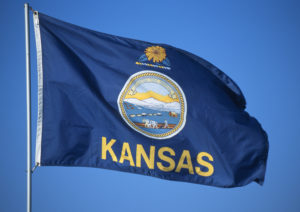 Kansas: The Kansas Court of Appeals reinstated a lawsuit that challenged provisions of a voting law enacted in 2021 that opponents argue is unconstitutional and limits voting rights. The lawsuit was filed in 2021 by Loud Light, the League of Women Voters of Kansas, the Topeka Independent Living Resource Center and the Kansas Appleseed Center for Law and Justice. They challenged provisions of a law passed by the Republican-controlled Legislature that limit how many advance mail ballots individuals can collect and require election officials to match the signatures on an advance ballot to a person’s voter registration record. Kansas Attorney General Kris Kobach said Friday he would appeal the ruling. The unanimous opinion, written by Judge Stephen Hill, said the two provisions impair the right to vote. “It was by free elections that we gained statehood. Thus, voting rights are preserved in the Kansas Constitution,” Hill wrote. “Great care must be taken when trying to limit or infringe on those rights. Voting was important then. Voting is important now.” The court sent the lawsuit back to Shawnee County District Court Judge Teresa Watson, who originally dismissed it in April 2022 after finding the restrictions were reasonable. The ruling does not strike down the law. But it requires Watson to review the lawsuit using “strict scrutiny,” which is the highest standard of legal review.
Kansas: The Kansas Court of Appeals reinstated a lawsuit that challenged provisions of a voting law enacted in 2021 that opponents argue is unconstitutional and limits voting rights. The lawsuit was filed in 2021 by Loud Light, the League of Women Voters of Kansas, the Topeka Independent Living Resource Center and the Kansas Appleseed Center for Law and Justice. They challenged provisions of a law passed by the Republican-controlled Legislature that limit how many advance mail ballots individuals can collect and require election officials to match the signatures on an advance ballot to a person’s voter registration record. Kansas Attorney General Kris Kobach said Friday he would appeal the ruling. The unanimous opinion, written by Judge Stephen Hill, said the two provisions impair the right to vote. “It was by free elections that we gained statehood. Thus, voting rights are preserved in the Kansas Constitution,” Hill wrote. “Great care must be taken when trying to limit or infringe on those rights. Voting was important then. Voting is important now.” The court sent the lawsuit back to Shawnee County District Court Judge Teresa Watson, who originally dismissed it in April 2022 after finding the restrictions were reasonable. The ruling does not strike down the law. But it requires Watson to review the lawsuit using “strict scrutiny,” which is the highest standard of legal review.
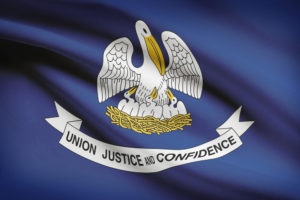 Louisiana: The Orleans Parish Registrar of Voters has been sued ahead of the March 25 election. A lawsuit was filed in Civil District Court and names Sandra Wilson in the suit, claiming her office sent incomplete absentee ballots to residents in Orleans Parish ahead of the March 25 elections. According to the lawsuit, some residents in District 93 received ballots without the runoff election as an option to vote on. The suit claims Wilson illegally made residents reach out to the office to request a new, correct ballot instead of issuing new ballots to all voters. Last week the Louisiana Secretary of State’s Office issued the following statement acknowledging the ballot errors: “Of the more than 14,000 absentee ballots sent by the Orleans Parish Registrar’s office, a small number of voters in House District 93 may have received the wrong ballot style via mail for the March election due to a packaging error. This issue has since been corrected. The suit asks that Wilson’s office issue new absentee ballots to all voters to ensure their votes are counted. A New Orleans judge has ruled in favor of the registrar’s office.
Louisiana: The Orleans Parish Registrar of Voters has been sued ahead of the March 25 election. A lawsuit was filed in Civil District Court and names Sandra Wilson in the suit, claiming her office sent incomplete absentee ballots to residents in Orleans Parish ahead of the March 25 elections. According to the lawsuit, some residents in District 93 received ballots without the runoff election as an option to vote on. The suit claims Wilson illegally made residents reach out to the office to request a new, correct ballot instead of issuing new ballots to all voters. Last week the Louisiana Secretary of State’s Office issued the following statement acknowledging the ballot errors: “Of the more than 14,000 absentee ballots sent by the Orleans Parish Registrar’s office, a small number of voters in House District 93 may have received the wrong ballot style via mail for the March election due to a packaging error. This issue has since been corrected. The suit asks that Wilson’s office issue new absentee ballots to all voters to ensure their votes are counted. A New Orleans judge has ruled in favor of the registrar’s office.
 Michigan: Hagan Realty Inc. is suing the city of East Lansing, asking a judge to strike down an ordinance requiring landlords to tell tenants how and where to register to vote. The suit claims the city is violating landlords’ First Amendment rights by forcing them to provide voter application forms and other information to new tenants. “Where East Lansing’s interest is to disseminate an ideology or policy relating to voting, no matter how acceptable to some, those interests cannot outweigh the First Amendment right to avoid being the courier of the government’s message,” said the suit filed in U.S. District Court. A 2013 city ordinance requires landlords to give tenants specific information on how to register to vote, provide them with a voter registration application and inform them that further information is available on the state elections website, the lawsuit said. Violations are a civil infraction. The ordinance does not specify the penalty, although city code generally sets a fine of up to $1,000 for civil infractions, according to the suit.
Michigan: Hagan Realty Inc. is suing the city of East Lansing, asking a judge to strike down an ordinance requiring landlords to tell tenants how and where to register to vote. The suit claims the city is violating landlords’ First Amendment rights by forcing them to provide voter application forms and other information to new tenants. “Where East Lansing’s interest is to disseminate an ideology or policy relating to voting, no matter how acceptable to some, those interests cannot outweigh the First Amendment right to avoid being the courier of the government’s message,” said the suit filed in U.S. District Court. A 2013 city ordinance requires landlords to give tenants specific information on how to register to vote, provide them with a voter registration application and inform them that further information is available on the state elections website, the lawsuit said. Violations are a civil infraction. The ordinance does not specify the penalty, although city code generally sets a fine of up to $1,000 for civil infractions, according to the suit.
Opinions This Week
National Opinions: Student voting | Ex-felon voting rights
Alabama: ERIC
Alaska: Ranked choice voting
Arizona: Election legislation, II, III | Runoff elections | Election deniers
Connecticut: Ranked choice voting
Florida: ERIC
Louisiana: List maintenance | Recall
Maine: Ranked choice voting
Maryland: Ranked choice voting
Michigan: Ballot access
Minnesota: Jail voting
Missouri: Election lies
New Jersey: Monmouth County
Ohio: Election legislation | Ballot access | ERIC | Voter integrity
Pennsylvania: ERIC
Rhode Island: Poll workers
South Carolina: Voter fatigue
Texas: College polling places
Utah: Election policies
Vermont: Internet voting
West Virginia: Women’s History Month | Poll workers
Upcoming Events
Can We Improve the Way We Elect Our President?: Making Every Vote Count and Leadership Now Project will co-host a virtual program to discuss the U.S. presidential election system based on the Electoral College provisions of the Constitution. We hope that you will join us. The purpose of the program is to inform and energize opinion leaders, business professionals, and others interested in democracy issues about how the Electoral College works; describe the damages it causes and why; and discuss possible reforms. It is not the purpose of the program to enlist support for any particular reform proposal. Neither MEVC nor Leadership Now endorses a particular proposal. But the program will cover the reform proposals, and speakers and panelists will express their views on them. At the core of the April 4 program will be a panel moderated by E.J. Dionne, nationally syndicated columnist and long-time student of and commentator on the country’s presidential election process and the Electoral College system. When: April 4 at 2:30pm Eastern. Where: Online.
How To Rig An Election: Actor Tom Hanks and former American Civil Liberties Union deputy legal director Jeffery Robinson have produced a new short film about the contested and consequential 1876 presidential election that was resolved in a backroom deal. On Thursday, April 6 at 3:00 p.m. ET, Hanks and Robinson join The Washington Post’s Kate Woodsome to discuss “How to Rig an Election: The Racist History of the 1876 Presidential Contest.” The animated short will be distributed by The Post Opinions section. When: April 6 at 3pm Eastern. Where: Online.
U.S. Election Assistance Commission Standards Board Annual Meeting: This meeting is in-person and open to the public. This meeting is to conduct an annual review the VVSG 2.0 Requirements and implementation, review the status of the EAC’s e-poll book pilot program, discuss ongoing EAC programs, and address election official security and mental health concerns. This meeting will include a question and answer discussion between board members and EAC staff. Board members will also review FACA Board membership guidelines and policies with EAC Acting General Counsel and receive a general update about the EAC programing. The Board will also elect nine members to the Executive Board Committee. Background: On February 10, 2021 the U.S. Election Assistance Commission (EAC) announced the adoption of the Voluntary Voting System Guidelines (VVSG) 2.0, the fifth iteration of national level voting system standards. The Federal Election Commission published the first two sets of federal standards in 1990 and 2002. The EAC then adopted Version 1.0 of the VVSG on December 13, 2005. In an effort to update and improve version 1.0 of the VVSG, on March 31, 2015, the EAC commissioners unanimously approved VVSG 1.1. HAVA designates a 110-member Standards Board to assist EAC in carrying out its mandates under the law. The board consists of 55 state election officials selected by their respective chief state election official, and 55 local election officials selected through a process supervised by the chief state election official. When: April 18-19. Where: Washington, DC.
Election Center Special Workshop: Courses offered will include: Course 9 (History III – 1965 to Present), Course 10 (Constitutional Law of Elections, renewal) and Course 15 (Training in Elections: Reaching All Levels). When: April 27-30. Where: Houston.
ERSA 2023 Conference: The 7th Annual Summer Conference on Election Science, Reform, and Administration (ESRA) will be held in person from Wednesday, May 31 to Friday, June 2, at the University of Georgia in Athens, Georgia. Details about this year’s conference program are forthcoming. When: May 31-June 2. Where: Atlanta
NACo Annual Conference: The National Association of Counties (NACo) Annual Conference & Expo is the largest meeting of county elected and appointed officials from across the country. Participants from counties of all sizes come together to shape NACo’s federal policy agenda, share proven practices and strengthen knowledge networks to help improve residents’ lives and the efficiency of county government. When: July 21-24. Where: Travis County, Texas.
Job Postings This Week
electionlineWeekly publishes election administration job postings each week as a free service to our readers. To have your job listed in the newsletter, please send a copy of the job description, including a web link to mmoretti@electionline.org. Job postings must be received by 5pm on Wednesday in order to appear in the Thursday newsletter. Listings will run for three weeks or till the deadline listed in the posting.
Administrative Specialist II (Elections Specialist – Chinese), King County Elections— This is an amazing opportunity to be engaged in the election process! This benefits-eligible Term-Limited Temporary (TLT) position is anticipated to last until December 2024. A Special Duty Assignment may be considered for King County Career Service employees who have passed their initial probationary period. The Department of Elections – is searching for energetic and resourceful professionals who like to “get stuff done”. The Administrative Specialist II positions in the Voter Services Department combines an exciting, fast-paced environment with the opportunity to cultivate talents and apply a variety of skills. The ideal candidate will have a desire to help ensure the democratic process through public service. They will thrive in an innovative environment and will not hesitate to roll up both sleeves, work hard, have fun, and get the job done. King County Elections (KCE) manages voter registrations and elections for more than 1.4 million voters in King County, the largest vote-by-mail county in the United States. KCE’s mission is to conduct accessible, secure, and accurate elections. As a leader in providing inclusive elections, KCE is focused on three key priorities – (1) actively identifying and working to remove barriers to voting at both the individual and community level, (2) strengthening relationships with community and governmental partners, and (3) creating a culture of professional growth and development, openness and inclusion. Salary: $24.59 – $31.30 Hourly. Application: For the complete job listing and to apply, click here.
Assistant County Clerk-Recorder, Nevada County, California— Under administrative oversight you can be assisting with planning, organizing, directing and leading the activities of the County Clerk-Recorder’s office! The Assistant Clerk-Recorder will provide highly sophisticated staff assistance to the Clerk-Recorder! This management classification position serves at the will of the County Clerk-Recorder, and acts on her behalf in her absence and provides full line and functional management responsibility for the department’s Recorder and Election divisions. This position is distinguished from the County Clerk-Recorder in that the latter is an elected position and has overall responsibility for all functions of the department. Salary range: $111,810 – $136,500. Application: For the complete job listing and to apply, click here.
Assistant Manager-Poll Worker Department, Palm Beach County, Florida— The Palm Beach County Supervisor of Elections is looking for an experienced Assistant Poll Worker Department Manager. In this role, you will oversee the planning and the completion of various projects, administrative functions, operations, and specialized tasks in the Poll Worker Department. The work involves knowledge and application of departmental operations, planning, assigning responsibilities, monitoring election worker classes, maintaining records, evaluating performance, and the ability to review work for accuracy. This position requires initiative and sound independent judgement in the application of office policies, election laws, and procedures. Must be personable and maintain effective working relationships with colleagues, associates, and the general public. All work is performed under the guidance of the Supervisor of Elections. The ideal candidate will have an excellent work ethic, including consistent performance, reliability, and attendance. The desire and ability to work well in a fast-paced collaborative environment with a smile are essential to the position. Application: For the complete job listing and to apply, click here.
Associate Director, Political Science, MIT Election Data and Science Lab— To serve in a leadership role by working with the faculty director to develop and implement an expanded strategic vision of MEDSL and to manage operations and administration of the lab’s activities. Will bear primary responsibility for ensuring that the lab’s activities are responsive to the most pressing needs of election administrators throughout the United States and for maintaining robust lines of communication with election officials and allied research institutions. MEDSL is dedicated to the creation of knowledge, insights, and data necessary to increase understanding and guide improvement of elections as they are conducted in the United States. Required: bachelor’s degree; five years’ direct experience working in election administration or election science (which may have been acquired through work as a state or local administrator, leader of a nonprofit organization, or academic researcher); tactical and strategic approach to responsibilities; excellent problem-solving, organizational, project management, and written and verbal communication and presentation skills; organizational and cultural awareness; diplomacy and good judgment; initiative; interest in contributing to the progress of scientific research by facilitating the work of others; discretion and judgment with confidential information/issues; and proficiency with Microsoft Word, Excel, and PowerPoint. Must be able to achieve big picture results while paying attention to detail; follow through and achieve objectives in a timely manner; keep teams, projects, and deliverables on track; coordinate multiple tasks, set priorities, deliver results, and meet deadlines; exert influence, negotiate, and work across boundaries; and work independently and collaboratively. Preferred: graduate degree in law, political science, public policy, public administration, management, or related field. Application: For the complete job listing and to apply, click here.
Chief Deputy Registrar of Voters, San Bernardino, California— The San Bernardino County Registrar of Voters seeks a dynamic and innovative administrator who can lead and thrive in a fast-paced environment to manage our elections programs, processes, and team. The Chief Deputy Registrar of Voters is a forward-thinking individual that assists with guiding the future direction of the department and its processes, taking a hands-on approach to find solutions while working collaboratively with a knowledgeable and dedicated team. The Chief Deputy Registrar of Voters is a key member of the Department’s senior management team, participating in organizational strategic planning and administering election programs. The position serves as a Chief over a division of the Registrar of Voters (ROV) office and has primary responsibility for assisting the ROV in planning, conducting, and certifying all Primary, General, and Special elections. Salary: $85,425.60 – $118,684.80. Application: For the complete job listing and to apply, click here.
Chief Information Officer, Illinois State Board of Elections— Functions as Chief Information Officer (CIO) of the SBE Information Technology Systems. Responsibilities encompass full range of information services; application design and development, system administration, data administration, operations, production control, and data communications. In conjunction with the Board, Executive Director, and Executive staff, the CIO determines the role of information systems in achieving Board goals. Defines goals in terms of statutory obligations to be met, problems to be solved, and/or opportunities that can be realized through the application of computerized information systems. Prepares and submits budget based projections of hardware, software, staff and other resource needs to adequately provide for existing systems, as well as support of new project initiatives. Advises Executive Staff in matters relating to information technology. Develops presentations and reports for the Board and Administrative Staff. In conjunction with Executive Staff, evaluates system performance to determine appropriate enhancements. Salary: $7,885 – $13,237 Monthly. Application: For the complete job listing and to apply, click here.
Communications Director, NonproftVote— Are you a seasoned communications professional concerned about the state of our democracy? Do you believe in the power of nonprofits and nonpartisan voter engagement? If so, we have an opportunity to put your skills to work in a mission-driven environment to foster a more engaged and inclusive democracy. Nonprofit VOTE equips our nation’s nonprofits with nonpartisan tools and resources to help the communities they serve participate in voting and democracy. In doing so, we seek to close participation gaps among populations underrepresented in the political process. Additionally, Nonprofit VOTE manages the collaborative work of National Voter Registration Day, a single day of coordinated field, technology, and media strategies to raise awareness of voter registration opportunities and help hundreds of thousands of Americans register to vote. Working within a small, collaborative, and flexible team, your role as Communications Director will be to lead the communications of both Nonprofit VOTE and National Voter Registration Day. Our communications seek to weave a narrative around successful voter engagement efforts, highlighting key partners and traditionally underrepresented communities, while distributing practical advice and tools on how nonprofits can more effectively engage their communities. Salary: $75,000 and $90,000. Application: For the complete job listing and to apply, click here.
Digital and Multimedia Specialist, Issue One— The Digital and Multimedia Specialist (DMS) will play an integral role in expanding Issue One’s reach by producing and promoting multimedia content (including in-house video), managing and growing Issue One’s social media footprint, including Twitter, Facebook, LinkedIn, TikTok, and Instagram, running Issue One’s fundraising and action email list. The DMS will be proficient at video production and help Issue One reach new and larger audiences through video messaging, social media, and digital storytelling. The individual will also support key functions of the communications team, working closely with the communications director, senior communications manager, and communications specialist. The ideal candidate will possess a strong understanding of digital and multimedia strategies and tools needed to reach wider audiences and grow the organization’s brand in a competitive digital climate. Salary: $58K-$70K. Application: For the complete job listing and to apply, click here.
Director of Elections, Cumberland County, North Carolina— The Elections Director works under the administrative direction of the County Board of Elections and Executive Director of the State Board of Election. The Elections Director performs professional, managerial, and administrative work for the Board of Elections and carries out all duties or responsibilities as assigned by Chapter 163 of the General Statutes of the State of North Carolina and as delegated by members of the County Board in accordance with the laws of the State of North Carolina, GS 163-35 (d) and 163-33. Reports to the Chairman of the Cumberland County Board of Elections. Salary: $78,784.40 – $132,425.23. Application: For the complete job listing and to apply, click here.
Division Director, Illinois State Board of Elections— Subject to Executive Director approval; oversees the administration of human resource programs including, but not limited to, compensation, payroll, benefits, and leave; disciplinary matters; disputes and investigations; performance and talent management; productivity, recognition, and morale; occupational health and safety; and training and development. Serves as the Board’s subject matter expert relating to personnel and human resource matters. Identifies staffing and recruiting needs; develops and executes best practices for hiring and talent management. Conducts research and analysis of Board trends including review of reports and metrics from human resource information systems. Recommends, implements, and ensures compliance with agency policies and procedures including, but not limited to, hiring, disciplinary actions, employee grievances, compensation plan, and employee performance evaluations. Creates and oversees human resource practices, programs, and objectives that provide for an employee-oriented culture that emphasizes collaboration, innovation, creativity, and knowledge transfer within a diverse team. Oversees the day-to-day administrative aspects of the Board’s personnel programs; accuracy of bi-monthly payrolls; benefits; quarterly and annual EEO/AA reporting; and, employee transaction documentation. Facilitates professional development, training, and certification activities for staff; development and maintenance of agency-wide training programs for on-boarding, staff development, and knowledge transfer. Responsible for the administration and oversight over all disciplinary matters; including: investigation of complaints; conducting witness interviews; documentation gathering; drafting and submittal of investigation findings to Executive Staff; advising Division Directors and Executive Staff on disciplinary matters; and, drafting of formal disciplinary reprimands in accordance with policy. Has administrative oversight of the Chief Fiscal Officer regarding budgetary and fiscal matters under the purview of the Division of Administrative Services. Supervises and evaluates subordinate staff; facilitates knowledge transfers and cross trainings; performs other duties as required or assigned which are reasonably within the scope of the duties enumerated above. Salary: $6,023.00 – $12,374.00 Monthly. Application: For the complete job listing and to apply, click here.
Early Voting Coordinator, Wake County, North Carolina— re you looking to be more involved in your community? Are you ready to be a part of democracy in the making? If so, get ready to roll up your sleeves and become a part of history! Wake County Board of Elections is currently seeking an Early Voting Coordinator to join our dynamic and talented Early Voting Team. The Early Voting Coordinator plays a critical role in the management and logistical planning of Early Voting. This includes communicating, scheduling election service vendors and managing voting site support operations to include the physically demanding work of setting up Early Voting sites. What will you do as an Early Voting Coordinator? Plan and organize all Early Voting operations; Assist with development of Early Voting expansion budget items and analyze budget impacts of new election laws and state directives and incorporate the changes into Early Voting site procedures; Work with Town Clerks, Municipal Administrators, Facility Directors, Special Event Coordinators and Superintendents to secure use of facilities for Early Voting; Manage Early Voting facilities, including scheduling, communication, support, logistics, database management and site setups; Develop Early Voting ballot order and determine the distribution of ballots each Early Voting facility will receive; Update and maintain the Early Voting blog and Early Voting page of the Wake County Board of Elections website; Manage the Early Voting support Help Line; Post-election reconciliation duties to include provisional management, presentations to the Board and assisting with record retention. Salary: Hiring Range: $20.81 – $28.10. Application: For the complete job listing and to apply, click here.
Election Certification & Training Program Manager, Washington Secretary of State’s Office— The Elections Certification & Training Program Manager reports to the Deputy Director of Elections and is responsible for managing the Certification and Training team. Certification and Training is a mission critical program established and required by RCW 29A.04.530, 29A.04.560, 29A.04.590. The Certification and Training Manager develops and manages program objectives and priorities, in collaboration with external stakeholders including independently elected auditors and election officials. Additionally, the Program Manager makes collaborative strategic judgments and decisions balancing competing program demands or priorities for resources; develops, modifies, and implements division policy; formulates long-range strategic plans and projects . The Certification and Training Manager also integrates division and office policies and reviews the program for compliance with policies and strategic objectives. The position is responsible for four mission critical functions: Professional certification and training of local and state election administrators and county canvassing board members. Review of county election operations and procedures. Testing of all vote tabulation equipment used in each county during state primary and general elections. The election clearinghouse and publication program. The Program Manager also manages the process for adopting state rules and is the Election Division’s liaison with the USPS. Salary: $83,000 – $93,000. Application: For the complete job application and to apply, click here.
Election Director, Ohio Secretary of State’s Office— The Ohio Secretary of State Elections Division is recruiting for a Director of the Elections Division. The Director of the Elections Division (often called the Elections Director) oversees a team responsible for one of the Office’s two main functions: the oversight of local, state, and federal elections. The director serves as the Office’s primary liaison to Ohio’s 88 county boards of elections and, under the general direction of the Chief of Staff, leads the strategic planning and daily management of the division, including the following duties: Supervises division employees, including the enforcement of workplace policies, periodic review of performance, and recommendations for compensation and promotion; Oversees the issuance of advisories and directives that inform boards of changes to state election laws and sets uniform standards and policies by which elections are conducted; Develops and executes a detailed plan to manage the division’s work product in support of all timelines and deadlines associated with the annual elections calendar; Helps to develop and administer the division’s operational budget to ensure adequate levels of statewide support for the Office’s objectives; Provides daily support to boards of elections, including troubleshooting and training, as well as assistance as needed with administrative functions such as voting operations, poll worker recruitment, records processing and retention, post-election auditing, budgeting, legal compliance, and all other expectations established in the Secretary of State’s Election Official Manual; Reviews feedback from the Office’s regional operations teams and provides follow-up and support as needed; Determines the forms of ballots, poll books, voter instruction notices, and other forms relevant to the administration of elections; Oversees the collection, organization and review of statewide initiative and referendum petitions; Coordinates the meetings and direction of the Ohio Board of Voting Machine Examiners and the Ohio Ballot Board; Assists in the development and implementation of election-related public policy; Supports the Office’s legal staff in fulfilling public records requests, addressing litigation, and supporting law enforcement inquiries; Frequently briefs the Secretary of State and Chief of Staff on all relevant developments impacting the administration of elections in Ohio; Advises on vendor and consultant contracts; Assists the Office’s Information Technology team with election data retention and analysis efforts, including maintenance of voter registration records, investigations of fraud and irregularities, and publication of election statistics; Communicates with advocacy groups and election officials seeking guidance on the Office’s directives, advisories, or strategic policy initiatives; Represents the Secretary of State as needed in meetings, hearings, conferences, and other functions related to election administration; Seeks opportunities to strengthen the influence and visibility of the Office with election officials, advocacy groups, and influencers; Assists with the development of the Office’s communication content to intergovernmental contacts and third-party stakeholders; Manages the logistical planning and execution of the Office’s statewide Election Night Reporting operation, which includes the collection, tracking, tabulation, and reporting of election data from boards of elections to an official website for public consumption; Assists the Office’s legal staff in ensuring compliance with applicable rules, disclosures, and filings relating to lobbying and ethics laws; Collaborates with the Office’s External Affairs, Business Services, and Public Integrity divisions to support their respective objectives, including the development of public voter awareness campaigns, informational publications, website content, and other communications content; and Otherwise supports the Secretary of State and the Office of the Secretary of State in complying with all statutory obligations set forth under Ohio Revised Code Section 3501.05, “Election duties of secretary of state.” Salary: $125K-$140K. Application: For the complete job listing and to apply, click here.
Election Review Specialist, Washington Secretary of State’s Office— This Program Specialist 4 reports to the Certification and Training Program Manager and is responsible for overseeing the County Review Program which reviews the policies and procedures of Washington County Election Departments roughly every 5 years for compliance with state and federal election law. This collaborative process is intended to support local election officials, share best practices and is one of the reasons Washington State Election Administration is ranked highest in the nation. Salary: $57,324 – $77,028. Application: For the complete job listing and to apply, click here.
Elections Specialist, Thurston County, Washington— The position of Election Specialist assists in the preparation and operation of County elections by processing voter registration applications and election ballots, maintains voter registration records, selection and training of election extra help staff, and education programs. Receives significant public contact requiring effective communication and service to the customers in person, by email, and telephone. Salary: $3,637 – $4,837 Monthly. Deadline: March 31. Application: For the complete job listing and to apply, click here.
Elections Specialist-Ballot Processing, Pierce County, Washington— This is a great opportunity to play a critical role in this nation’s elections and democracy. Whether it is Election Day or another day of the year, we are working to continuously improve the voter experience and the conduct of elections. As a dedicated civil servant with experience in elections and supervising large teams, we are looking for an Elections Specialist for ballot processing. You will have the opportunity to be in the center of the action in Washington’s second-largest county. You will work with other specialists and management to develop a ballot processing schedule, and then schedule staff. You will also help with voter registration tasks when needed. We are looking for someone is comfortable and excels at leading and directing a large team of Seasonal elections workers ensuring accuracy in ballot processing and time-sensitive tasks. Someone who is customer service focused yet is deadline driven. Someone who values teamwork, is adaptable, learns new systems quickly, and who can communicate across all levels of the organization, with our customers and party observers. Multi-taskers with excellent written communication will be successful in this role. As an Elections Specialist, you will have the ability to immediately contribute to the team’s success. You will be guided through the process with coaching-focused managerial support, a team that wants you to be successful in your role, and an organizational culture that encourages continuous learning and professional development. Salary: $33.62 – $42.52 Hourly. Application: For the complete job listing and to apply, click here.
Elections Technician, Jefferson County, Colorado — Take your love of elections administration to the foothills of the Rocky Mountains! Under the direction of an Elections Manger, the Elections Technician is responsible for the administration of multiple duties that support the operations of the Clerk and Recorder’s Elections Division. The position administers processes for elections programs that will include data entry for voter registrations, customer service (via phone, email, and in-person), and day-to-day office administration. During election periods, manages the day-to-day operations of our Mail Ballot processing center; this includes Signature Verification & Challenge Team processing, Military & Overseas voters ballot processing, Ballot Removal, Duplication processing and Health Care Facilities visits. Oversees and manages the work of temporary election workers performing activities in support of the election. Salary: Target Hiring Range: $21.50 – $26.79 USD Hourly. Deadline: April 9. Application: For the complete job listing and to apply, click here.
Executive Director, Missouri Association of County Clerks and Election Officials— The Missouri Association of County Clerks and Election Authorities (MACCEA) is a professional association of county clerks and election authorities from Missouri’s 116 counties and election authority jurisdictions. MACCEA’s Executive Board is comprised of elected county clerks and appointed election directors whose full-time jobs are to manage county offices, conduct high profile elections, and work in the challenging environment of county government administration. The Board is a volunteer position and officers are elected by the association membership with additional members appointed by the Board President. The Executive Director position, established in 2022, will help the Board better support our membership in their roles as county clerks and election authorities, as well as support the association’s vision, mission, and goals. MACCEA seeks a contract Executive Director with diverse non-profit management, governance, conference planning, and communications experience. The Executive Director reports to the 12-member MACCEA Executive Board. Duties and association management are delegated to the Executive Director by the MACCEA Bylaws and under the direction of the Executive Board. Salary Range: $55,000 – $65,000. Application: For the complete job listing and to apply, click here.
Information Technology Security Analyst, Illinois State Board of Elections— The IT Security Analyst reports directly to the Manager of Cyber Operations and Infrastructure. Supports the administration, implementation, review, and improvement of endpoint, network, hardware, application, and data security practices. Implements, supports and monitors the agency’s information security applications, including email security, web security, endpoint security software, firewalls, intrusion prevention applications, data loss prevention, etc. Monitors system dashboards and logs for threat indicators. Analyzes data and performs necessary incident response procedures. Conducts network, system and application vulnerability assessments. Analyzes agency threat surface and makes recommendations to management to harden agency systems. Evaluates agency processes and implements and/or makes recommendations to enhance security. Reviews information received concerning threat events from end users, supervisory personnel, other federal, state, county and local agencies and governmental entities involved in the exchange of data with the State Board of Elections (SBE), external entities such as the Multi-State Information Sharing and Analysis Center (MS-ISAC), Elections Infrastructure Information Sharing and Analysis Center (EI-ISAC), trusted cybersecurity vendors, law enforcement agencies, and public information sources. Consults with SBE staff on security issues. Provides a high level of customer service to agency staff, state, county, and local election officials. Ensures service desk queues and incidents are handled in an appropriate and timely manner. Salary: $6,264 – $8,917 Monthly. Application: For the complete job listing and to apply, click here.
Legal Intern, Illinois State Board of Elections— The State Board of Elections’ Legal Division is seeking a legal intern to assist in the creation of the State Officers Electoral Board (SOEB) decision database. The candidate will be responsible for reviewing objections and related decisions to create a public research database of Board decisions. The Internship will require legal research and writing skills consistent with serving as agency counsel. Responsibilities include updating, reviewing and creating reference/training materials focused on election law. Application: For the complete internship listing and to apply, click here.
Senior Specialist-Voter Services, Johnson County, Kansas— The Senior Election Specialist – Voter Services will take a lead role on the voter services team within the Election Office. This position will oversee the office’s use of the statewide voter registration system and support other employees in their work within this vital system. This will require attention to detail and the ability to define a series of tasks to complete work within the system in an efficient and accurate manner for temporary employees. This position will also research and perform all geography changes within the statewide voter registration system to accommodate annexations made by cities as well as district boundary changes made by state and local governing bodies. The Senior Election Specialist – Voter Services will also participate in the programming of elections to include laying out paper ballots and designing the screens and audio for use on the ballot marking devices. This position will also receive and file all candidate paperwork including declarations of candidacy and required campaign finance disclosures. This position also actively mentors, coaches and collaborates with employees to enhance the county mission and vision keeping in mind the common goal of leaving our community better than we found it. Application: For the complete job listing and to apply, click here.
State Election Director, North Dakota Secretary of State’s Office— The Office of Secretary of State is seeking an election administration professional to join our team as Election Director. The successful candidate will have demonstrated success in election administration, be able to work in a fast-paced environment, balance a variety of responsibilities, and lead a team of 3-4 election staff. The Office of the Secretary of State team is made up of over 30 staff members who work diligently to support elections and ease of business in North Dakota. The Election Director will work closely with the Secretary of State leadership team to guide strategy for the agency and direct election administration and processes. The position will be responsible for implementing election best practices and training for the State of North Dakota, working closely with North Dakota’s 53 counties, to ensure uniform election procedures and processes. This position also leads voter education and awareness efforts to inform North Dakota voters about voting rights and processes. Hiring Salary: $6,400 – $8,100 per month. Application: For the complete job listing and to apply, click here.
System Administrator, Sarasota County, Florida— The Systems Administrator is an Information Technology professional responsible for the coordination, implementation, planning, investigating and serving as the liaison for all facets of data processing, to include any election related tasks. Salary: $40,996 – $87,630. Application: For the complete job listing and to apply, click here.
Systems Integration Specialist, Oregon Secretary of State’s Office— In this position you will serve as the system integration expert and ensure that the new Oregon voter registration system (Oregon Votes) properly interacts with hardware and software systems used by the Agency and counties. This is accomplished in part by, but not limited to: Integration, system support, reporting, and analysis and policy recommendation. Application: For the complete job listing and to apply, click here.
Marketplace
electionline provides no guarantees as to the quality of the items being sold and the accuracy of the information provided about the sale items in the Marketplace. Ads are provided directly by sellers and are not verified by electionline. If you have an ad for Marketplace, please email it to: mmoretti@electionline.org